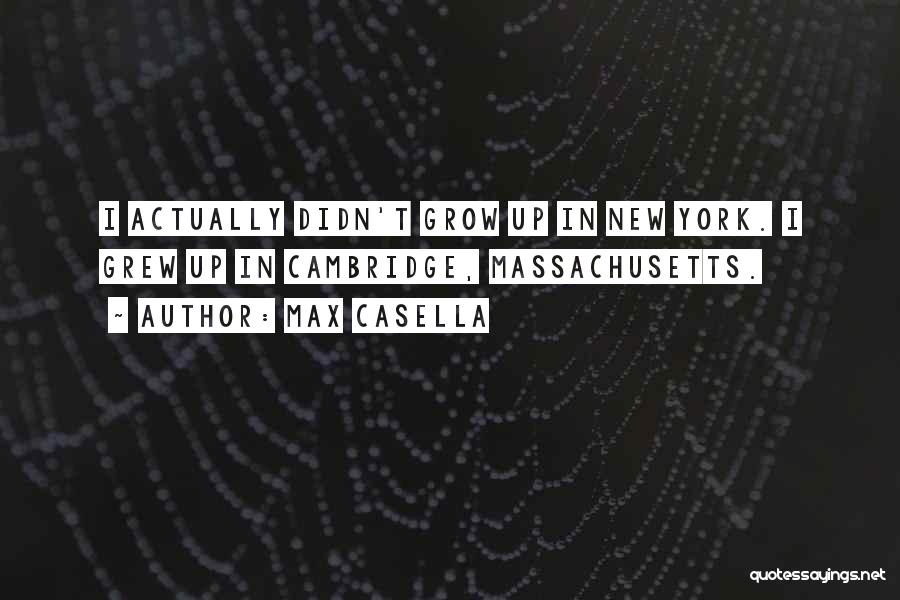Quotes & Sayings About Cambridge
Enjoy reading and share 100 famous quotes about Cambridge with everyone.
Top Cambridge Quotes
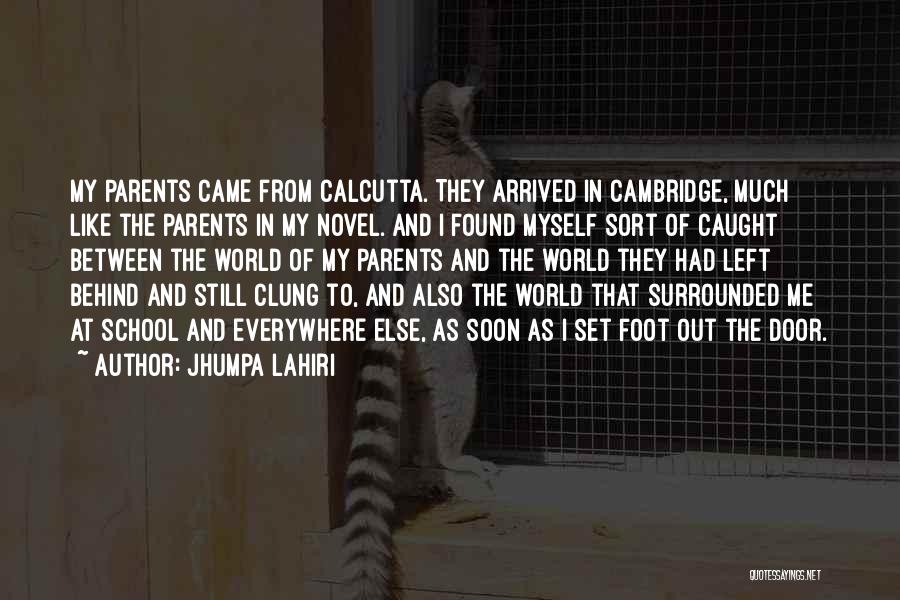
My parents came from Calcutta. They arrived in Cambridge, much like the parents in my novel. And I found myself sort of caught between the world of my parents and the world they had left behind and still clung to, and also the world that surrounded me at school and everywhere else, as soon as I set foot out the door. — Jhumpa Lahiri
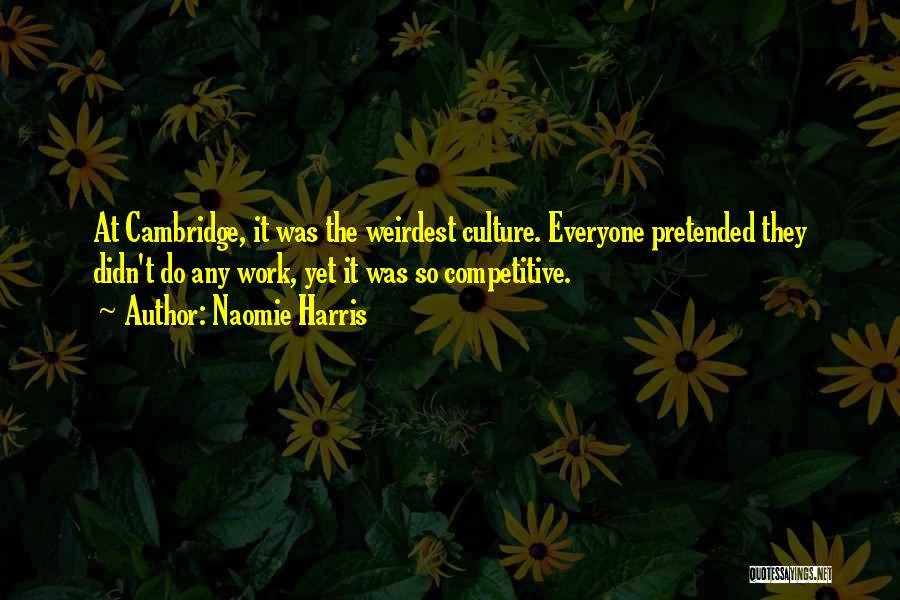
At Cambridge, it was the weirdest culture. Everyone pretended they didn't do any work, yet it was so competitive. — Naomie Harris
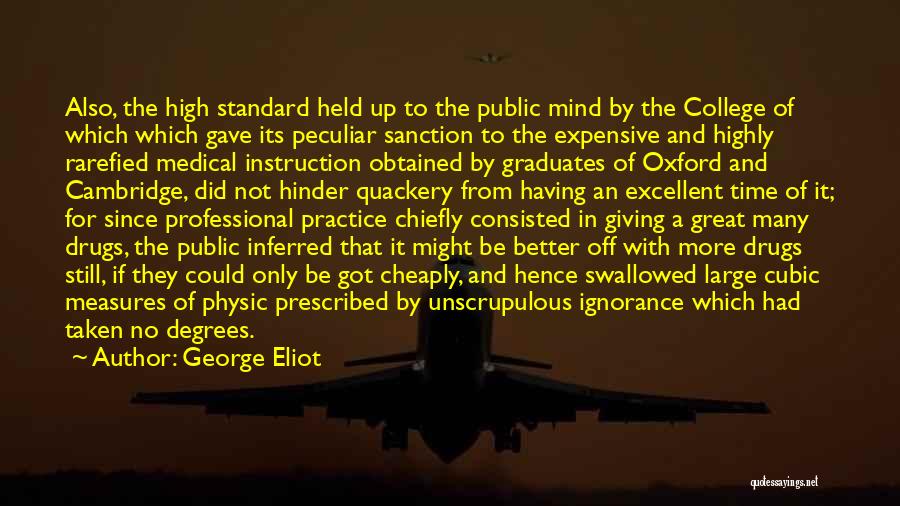
Also, the high standard held up to the public mind by the College of which which gave its peculiar sanction to the expensive and highly rarefied medical instruction obtained by graduates of Oxford and Cambridge, did not hinder quackery from having an excellent time of it; for since professional practice chiefly consisted in giving a great many drugs, the public inferred that it might be better off with more drugs still, if they could only be got cheaply, and hence swallowed large cubic measures of physic prescribed by unscrupulous ignorance which had taken no degrees. — George Eliot
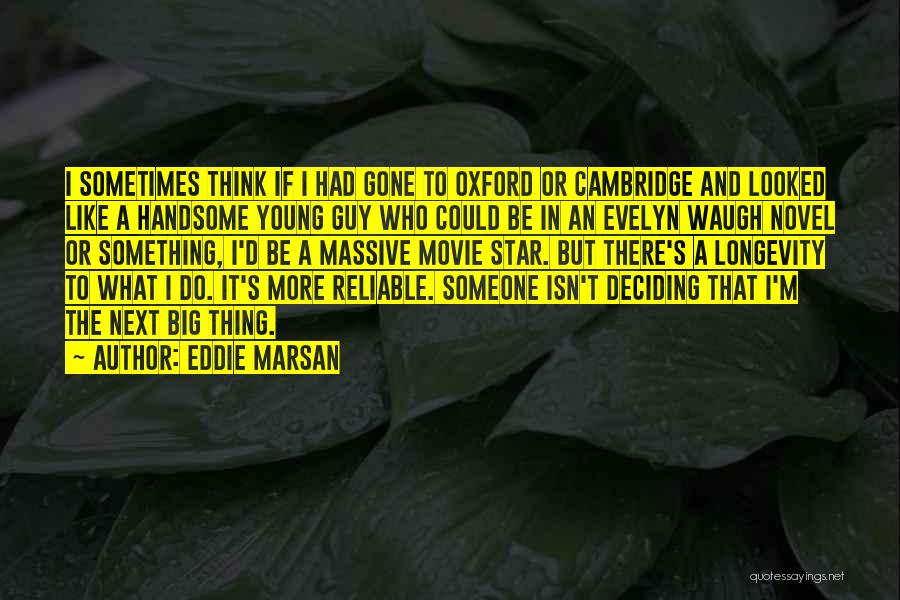
I sometimes think if I had gone to Oxford or Cambridge and looked like a handsome young guy who could be in an Evelyn Waugh novel or something, I'd be a massive movie star. But there's a longevity to what I do. It's more reliable. Someone isn't deciding that I'm the next big thing. — Eddie Marsan
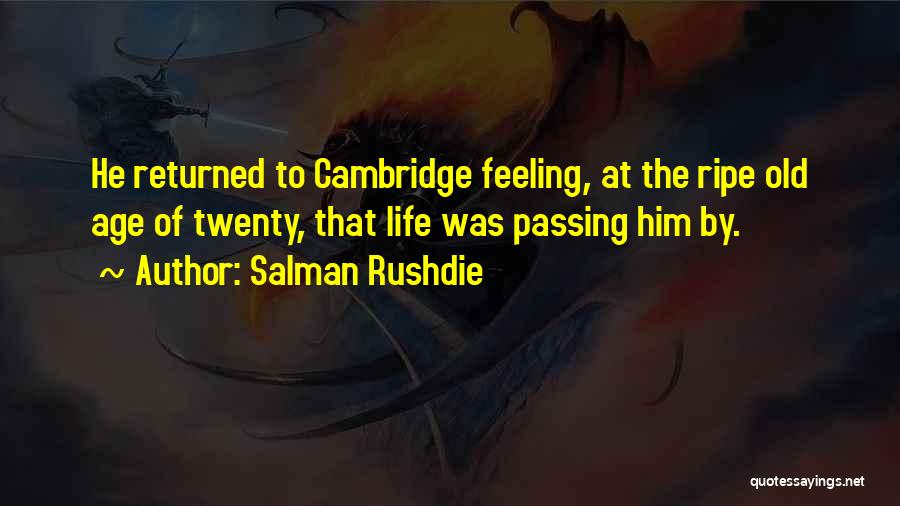
He returned to Cambridge feeling, at the ripe old age of twenty, that life was passing him by. — Salman Rushdie
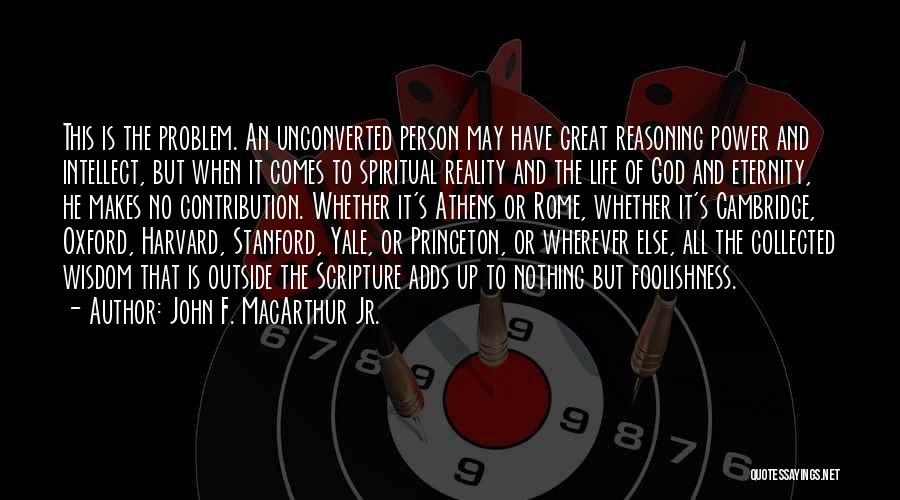
This is the problem. An unconverted person may have great reasoning power and intellect, but when it comes to spiritual reality and the life of God and eternity, he makes no contribution. Whether it's Athens or Rome, whether it's Cambridge, Oxford, Harvard, Stanford, Yale, or Princeton, or wherever else, all the collected wisdom that is outside the Scripture adds up to nothing but foolishness. — John F. MacArthur Jr.
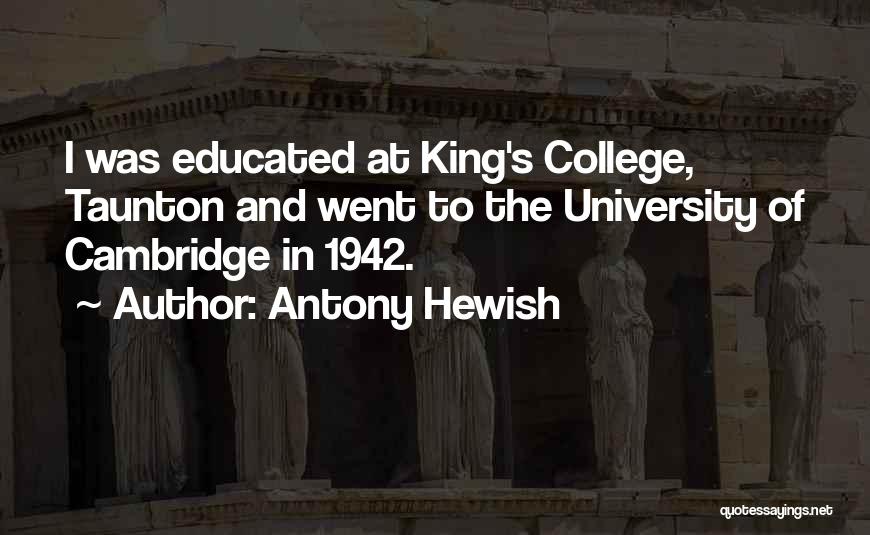
I was educated at King's College, Taunton and went to the University of Cambridge in 1942. — Antony Hewish
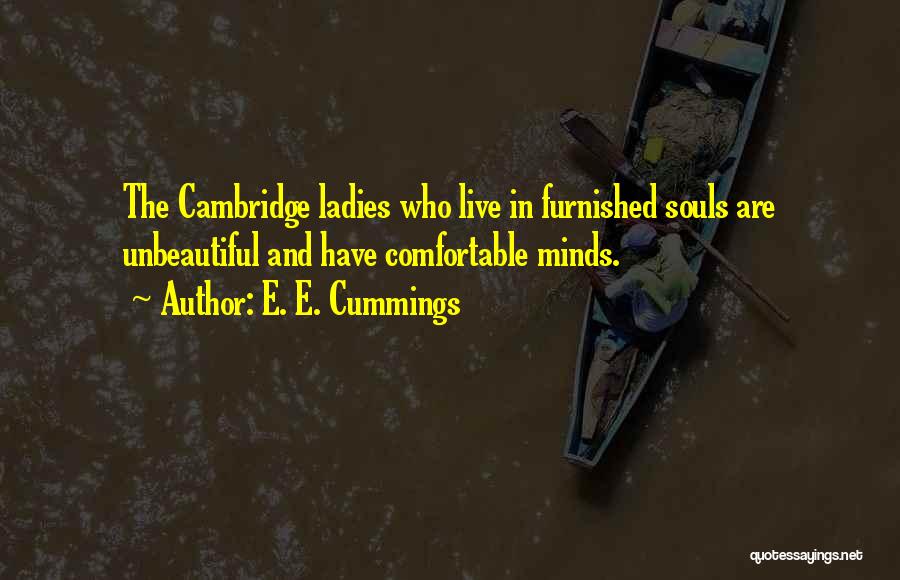
The Cambridge ladies who live in furnished souls are unbeautiful and have comfortable minds. — E. E. Cummings
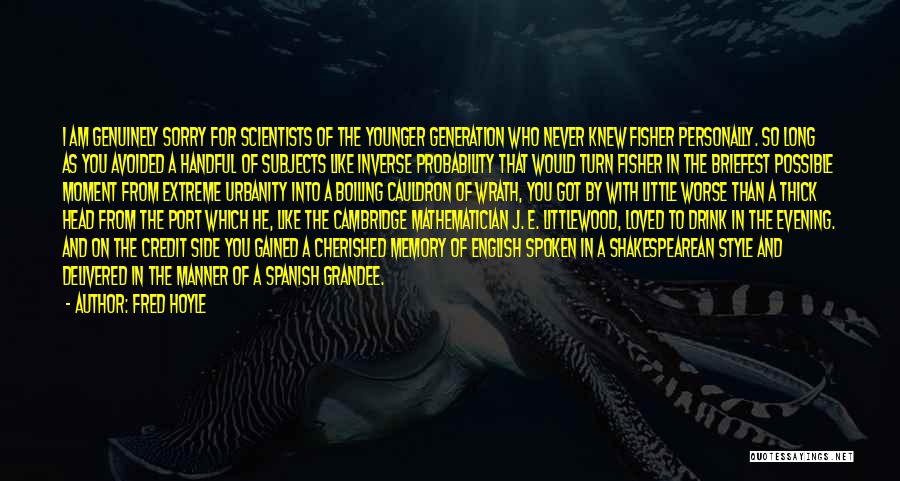
I am genuinely sorry for scientists of the younger generation who never knew Fisher personally. So long as you avoided a handful of subjects like inverse probability that would turn Fisher in the briefest possible moment from extreme urbanity into a boiling cauldron of wrath, you got by with little worse than a thick head from the port which he, like the Cambridge mathematician J. E. Littlewood, loved to drink in the evening. And on the credit side you gained a cherished memory of English spoken in a Shakespearean style and delivered in the manner of a Spanish grandee. — Fred Hoyle
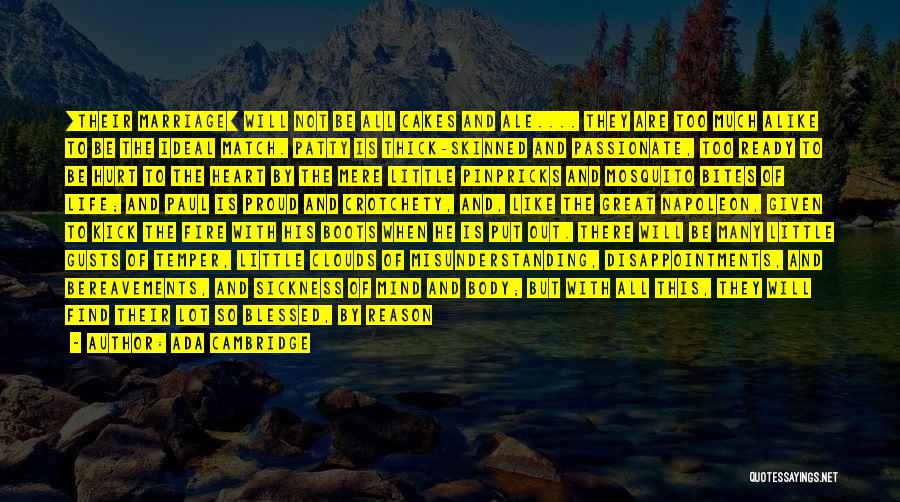
[Their marriage] will not be all cakes and ale.... They are too much alike to be the ideal match. Patty is thick-skinned and passionate, too ready to be hurt to the heart by the mere little pinpricks and mosquito bites of life; and Paul is proud and crotchety, and, like the great Napoleon, given to kick the fire with his boots when he is put out. There will be many little gusts of temper, little clouds of misunderstanding, disappointments, and bereavements, and sickness of mind and body; but with all this, they will find their lot so blessed, by reason of the mutual love and sympathy tat, through all the vicissitudes, will surely grow deeper and stronger every day they live together, that they will not know how to conceive a better one. — Ada Cambridge
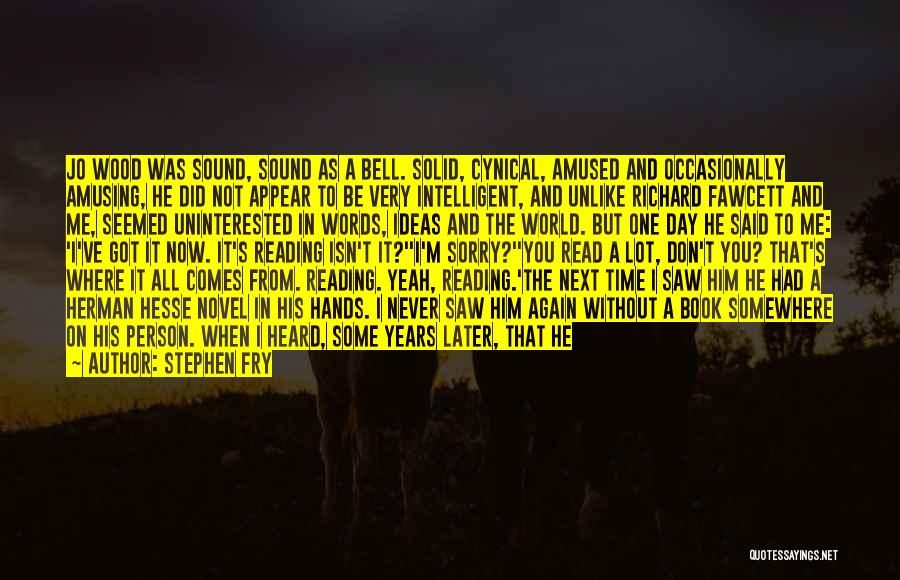
Jo Wood was sound, sound as a bell. Solid, cynical, amused and occasionally amusing, he did not appear to be very intelligent, and unlike Richard Fawcett and me, seemed uninterested in words, ideas and the world. But one day he said to me:
'I've got it now. It's reading isn't it?'
'I'm sorry?'
'You read a lot, don't you? That's where it all comes from. Reading. Yeah, reading.'
The next time I saw him he had a Herman Hesse novel in his hands. I never saw him again without a book somewhere on his person. When I heard, some years later, that he had got into Cambridge I thought to myself, I know how that happened. He decided one day to read. — Stephen Fry

When it was first proposed to establish laboratories at Cambridge, Todhunter, the mathematician, objected that it was unnecessary for students to see experiments performed, since the results could be vouched for by their teachers, all of them of the highest character, and many of them clergymen of the Church of England. — Bertrand Russell
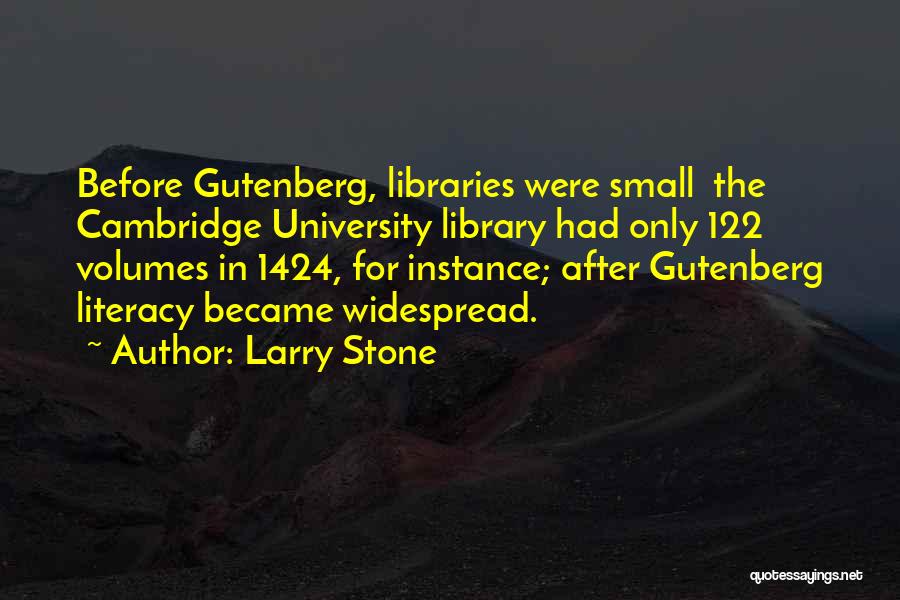
Before Gutenberg, libraries were small
the Cambridge University library had only 122 volumes in 1424, for instance; after Gutenberg literacy became widespread. — Larry Stone
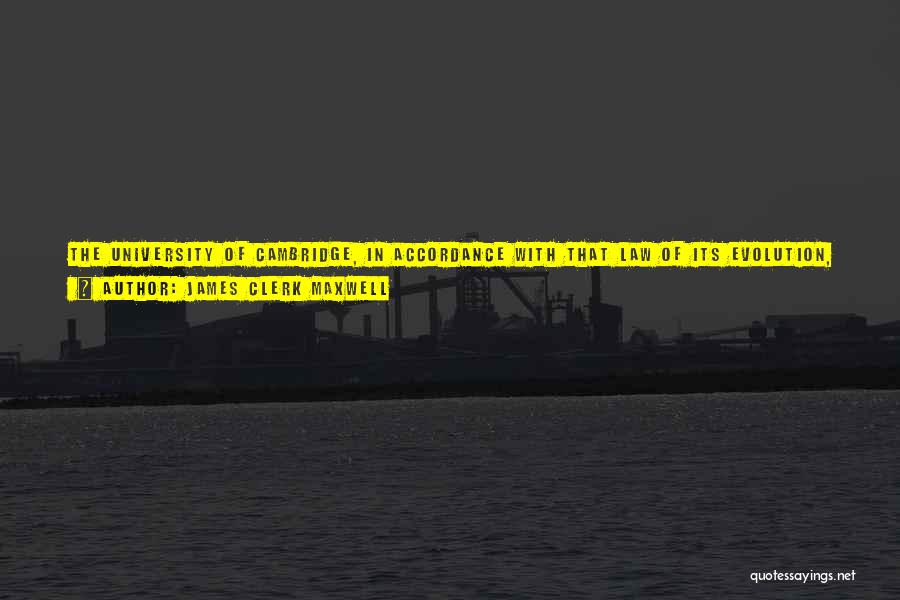
The University of Cambridge, in accordance with that law of its evolution, by which, while maintaining the strictest continuity between the successive phases of its history, it adapts itself with more or less promptness to the requirements of the times, has lately instituted a course of Experimental Physics. — James Clerk Maxwell
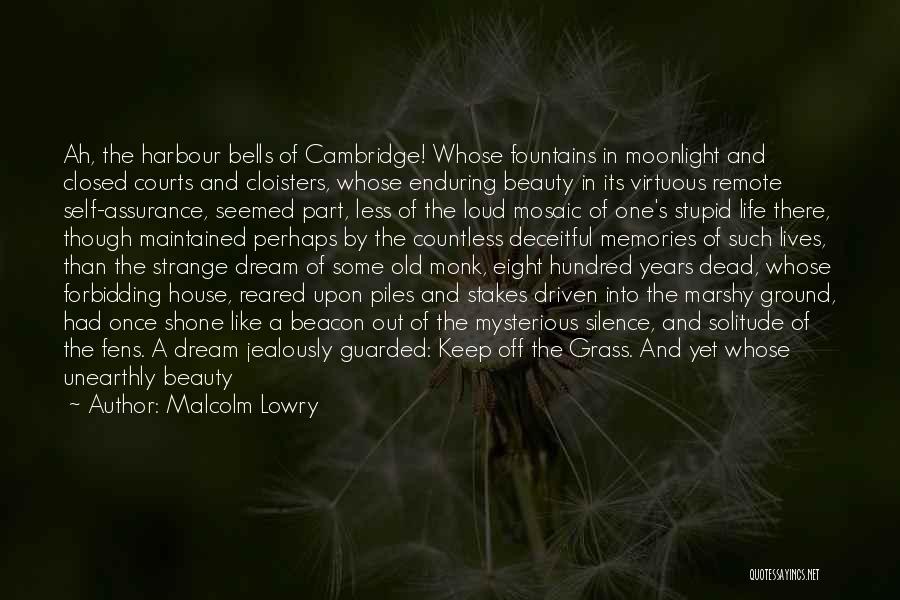
Ah, the harbour bells of Cambridge! Whose fountains in moonlight and closed courts and cloisters, whose enduring beauty in its virtuous remote self-assurance, seemed part, less of the loud mosaic of one's stupid life there, though maintained perhaps by the countless deceitful memories of such lives, than the strange dream of some old monk, eight hundred years dead, whose forbidding house, reared upon piles and stakes driven into the marshy ground, had once shone like a beacon out of the mysterious silence, and solitude of the fens. A dream jealously guarded: Keep off the Grass. And yet whose unearthly beauty compelled one to say: God forgive me. — Malcolm Lowry
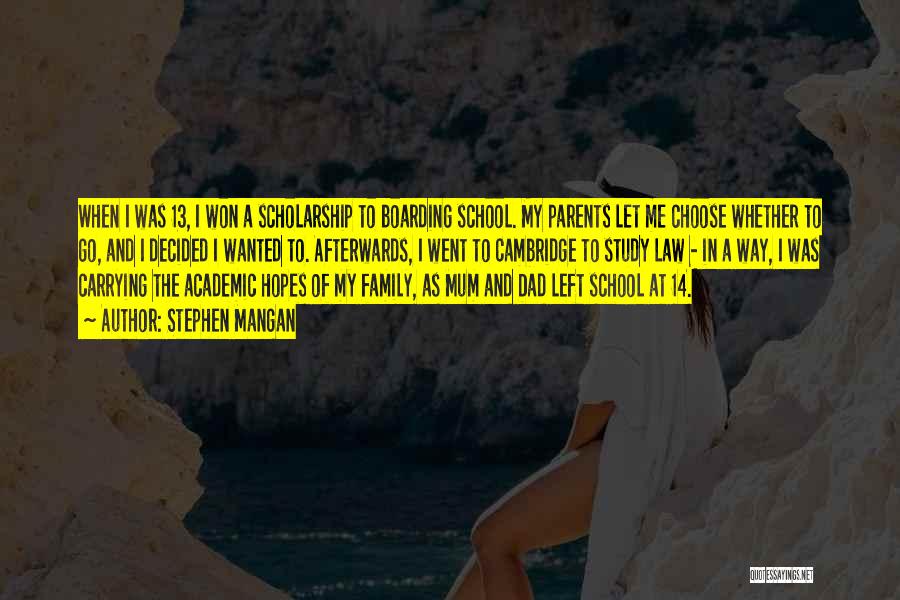
When I was 13, I won a scholarship to boarding school. My parents let me choose whether to go, and I decided I wanted to. Afterwards, I went to Cambridge to study law - in a way, I was carrying the academic hopes of my family, as Mum and Dad left school at 14. — Stephen Mangan
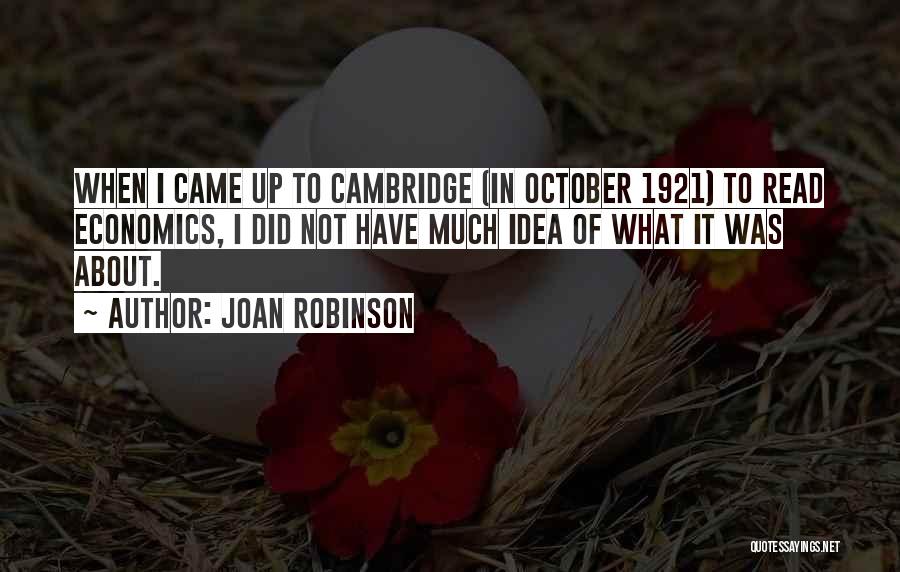
When I came up to Cambridge (in October 1921) to read economics, I did not have much idea of what it was about. — Joan Robinson
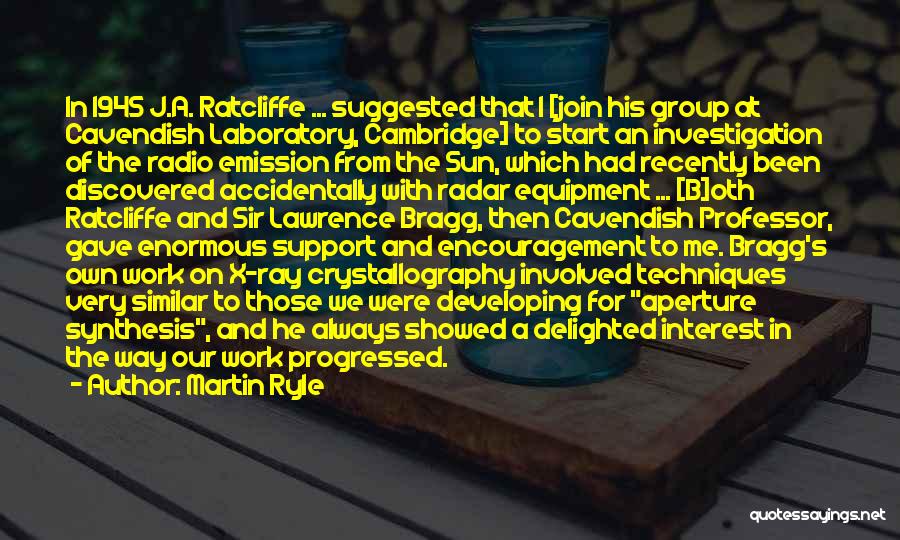
In 1945 J.A. Ratcliffe ... suggested that I [join his group at Cavendish Laboratory, Cambridge] to start an investigation of the radio emission from the Sun, which had recently been discovered accidentally with radar equipment ... [B]oth Ratcliffe and Sir Lawrence Bragg, then Cavendish Professor, gave enormous support and encouragement to me. Bragg's own work on X-ray crystallography involved techniques very similar to those we were developing for "aperture synthesis", and he always showed a delighted interest in the way our work progressed. — Martin Ryle
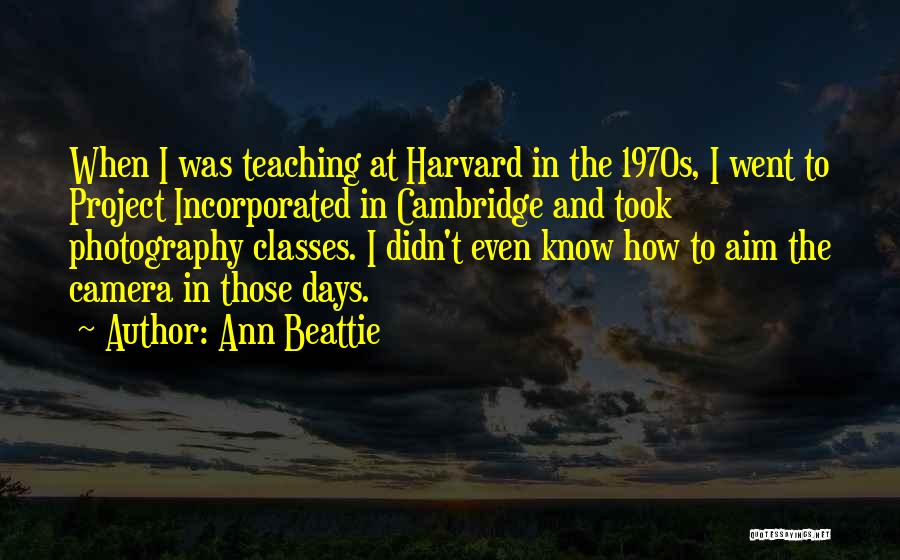
When I was teaching at Harvard in the 1970s, I went to Project Incorporated in Cambridge and took photography classes. I didn't even know how to aim the camera in those days. — Ann Beattie
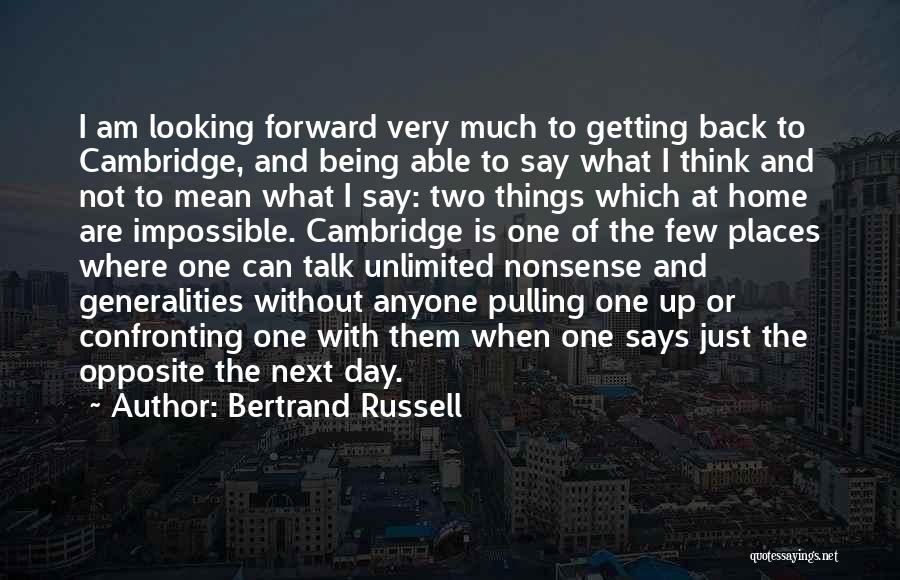
I am looking forward very much to getting back to Cambridge, and being able to say what I think and not to mean what I say: two things which at home are impossible. Cambridge is one of the few places where one can talk unlimited nonsense and generalities without anyone pulling one up or confronting one with them when one says just the opposite the next day. — Bertrand Russell
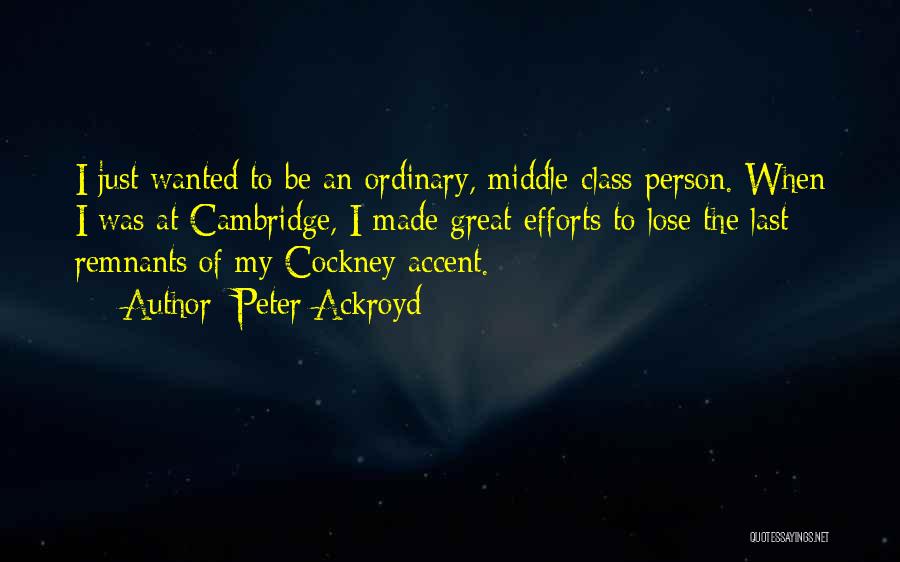
I just wanted to be an ordinary, middle-class person. When I was at Cambridge, I made great efforts to lose the last remnants of my Cockney accent. — Peter Ackroyd
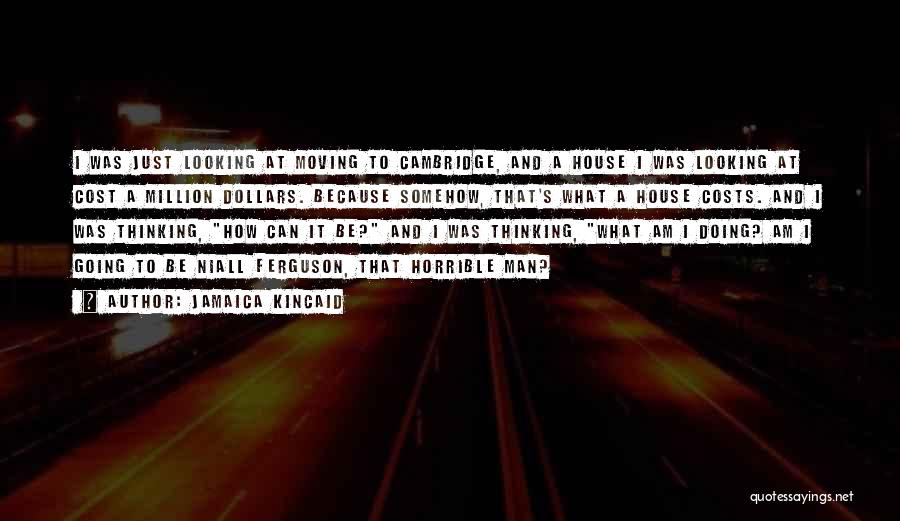
I was just looking at moving to Cambridge, and a house I was looking at cost a million dollars. Because somehow, that's what a house costs. And I was thinking, "How can it be?" And I was thinking, "What am I doing? Am I going to be Niall Ferguson, that horrible man? — Jamaica Kincaid
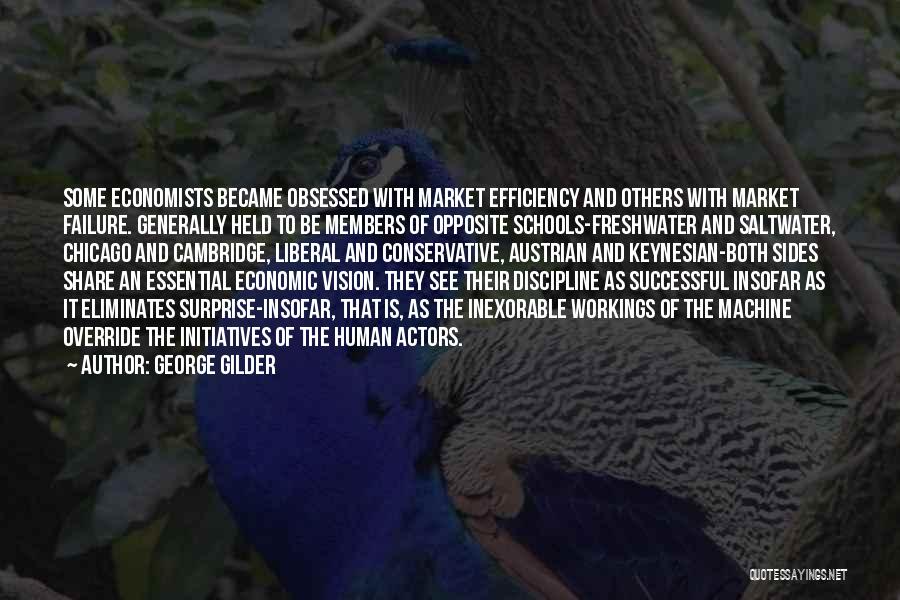
Some economists became obsessed with market efficiency and others with market failure. Generally held to be members of opposite schools-freshwater and saltwater, Chicago and Cambridge, liberal and conservative, Austrian and Keynesian-both sides share an essential economic vision. They see their discipline as successful insofar as it eliminates surprise-insofar, that is, as the inexorable workings of the machine override the initiatives of the human actors. — George Gilder
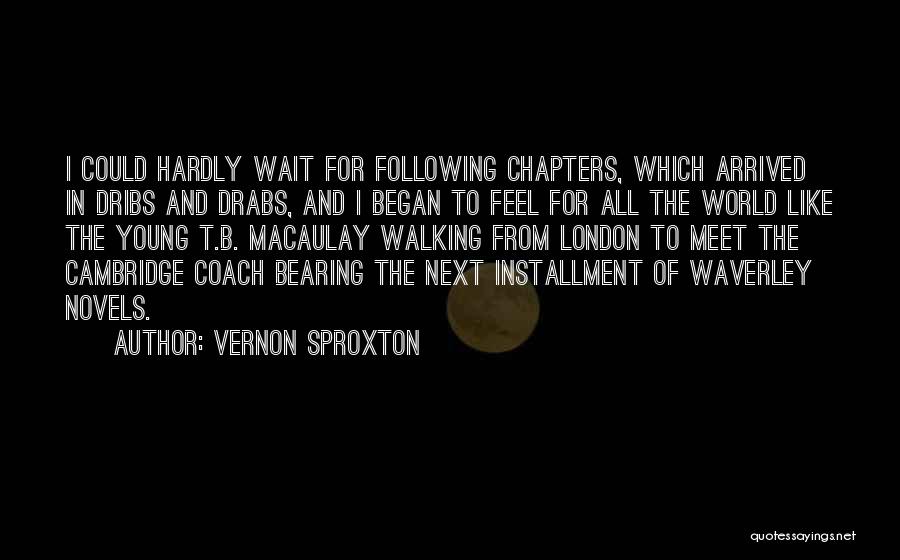
I could hardly wait for following chapters, which arrived in dribs and drabs, and I began to feel for all the world like the young T.B. Macaulay walking from London to meet the Cambridge coach bearing the next installment of Waverley novels. — Vernon Sproxton
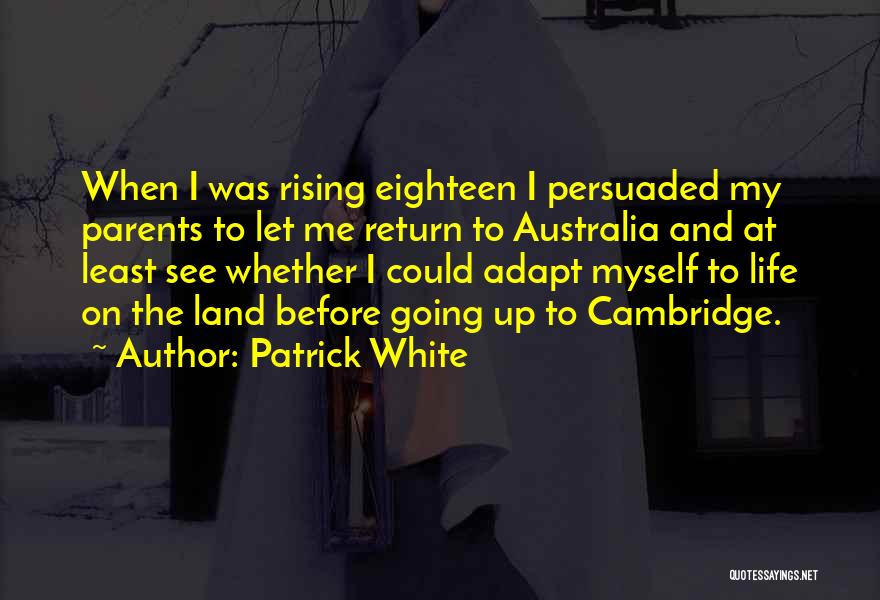
When I was rising eighteen I persuaded my parents to let me return to Australia and at least see whether I could adapt myself to life on the land before going up to Cambridge. — Patrick White
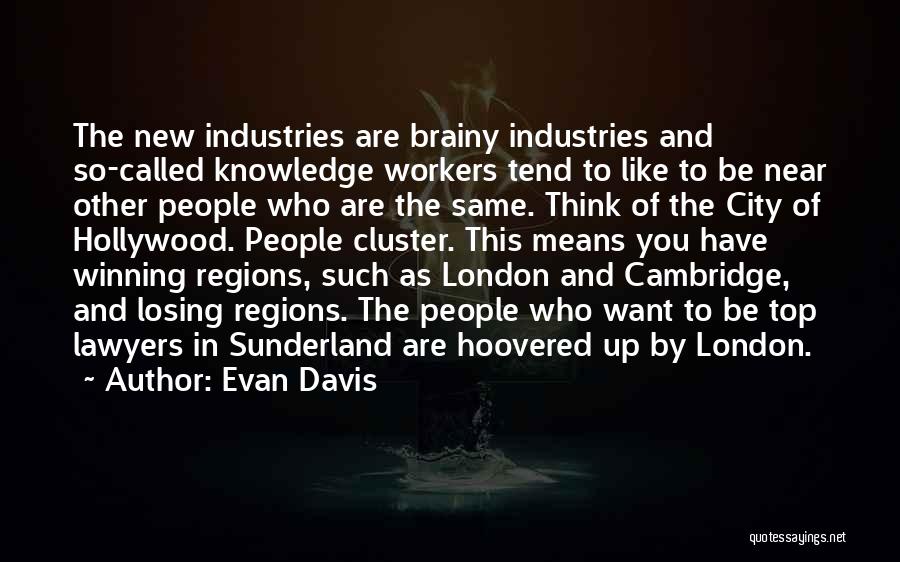
The new industries are brainy industries and so-called knowledge workers tend to like to be near other people who are the same. Think of the City of Hollywood. People cluster. This means you have winning regions, such as London and Cambridge, and losing regions. The people who want to be top lawyers in Sunderland are hoovered up by London. — Evan Davis
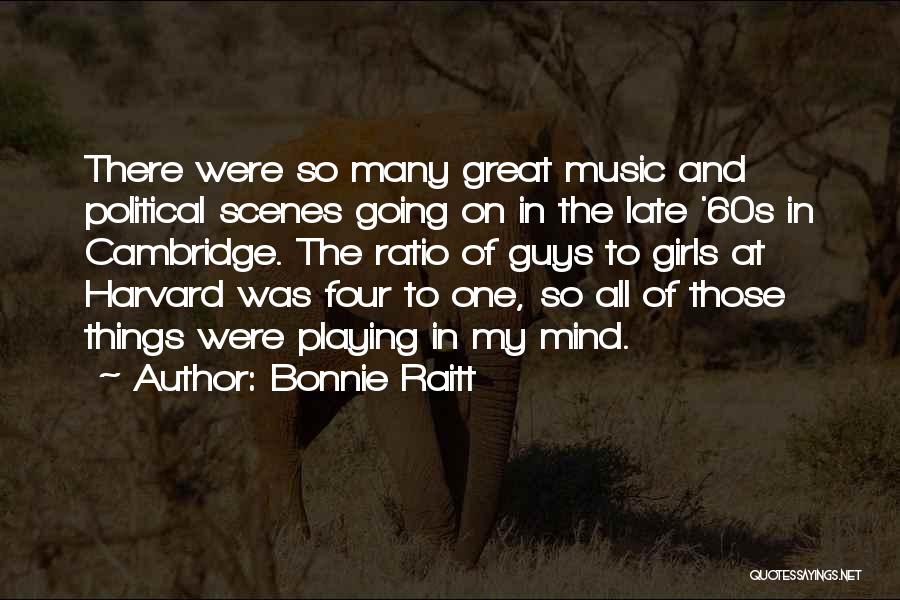
There were so many great music and political scenes going on in the late '60s in Cambridge. The ratio of guys to girls at Harvard was four to one, so all of those things were playing in my mind. — Bonnie Raitt
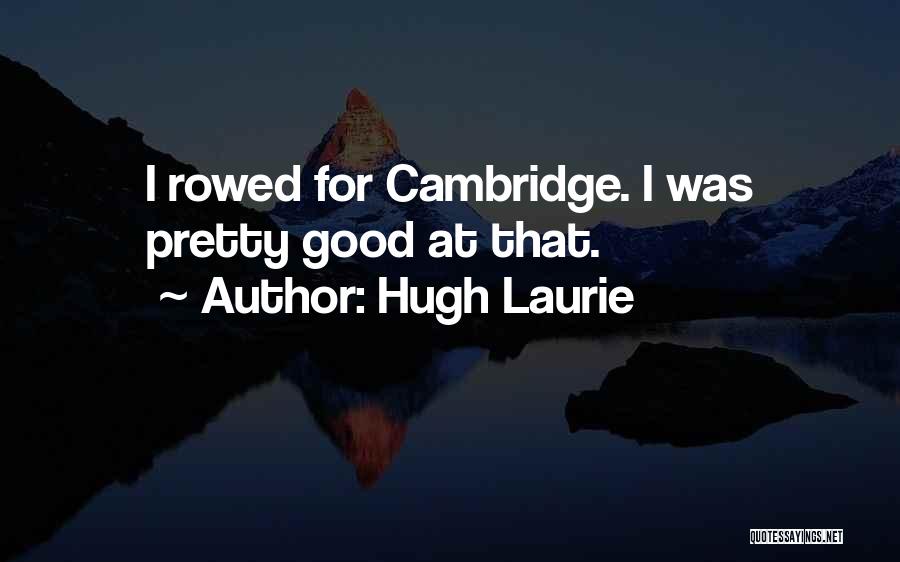
I rowed for Cambridge. I was pretty good at that. — Hugh Laurie
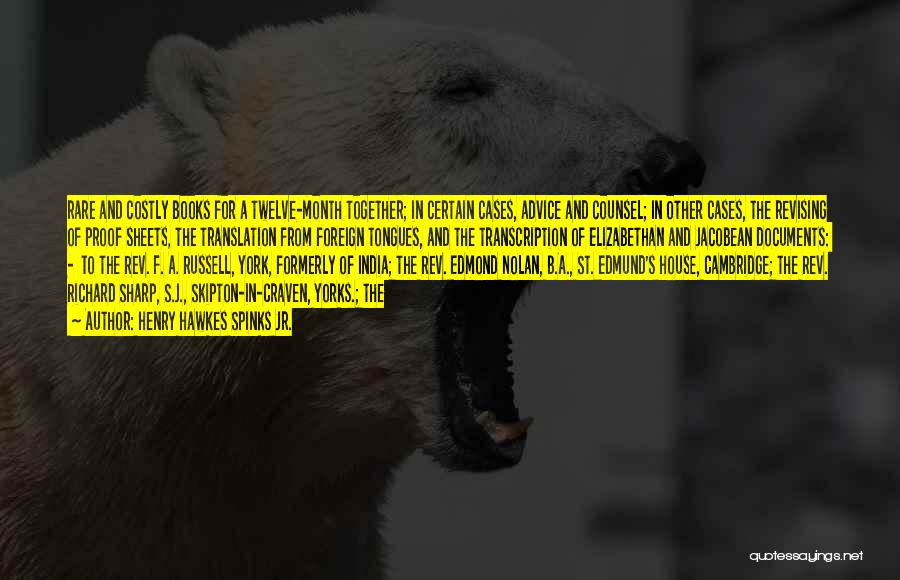
rare and costly books for a twelve-month together; in certain cases, advice and counsel; in other cases, the revising of proof sheets, the translation from foreign tongues, and the transcription of Elizabethan and Jacobean documents: - To the Rev. F. A. Russell, York, formerly of India; the Rev. Edmond Nolan, B.A., St. Edmund's House, Cambridge; the Rev. Richard Sharp, S.J., Skipton-in-Craven, Yorks.; the — Henry Hawkes Spinks Jr.
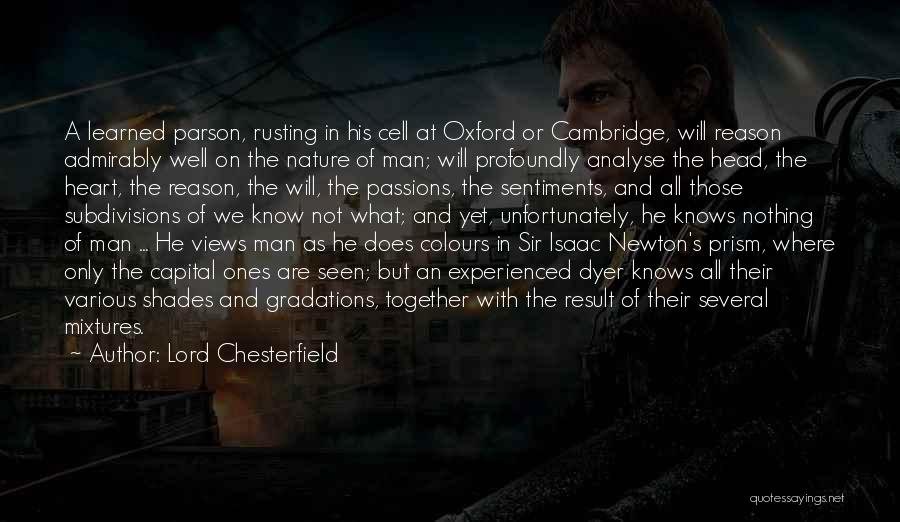
A learned parson, rusting in his cell at Oxford or Cambridge, will reason admirably well on the nature of man; will profoundly analyse the head, the heart, the reason, the will, the passions, the sentiments, and all those subdivisions of we know not what; and yet, unfortunately, he knows nothing of man ... He views man as he does colours in Sir Isaac Newton's prism, where only the capital ones are seen; but an experienced dyer knows all their various shades and gradations, together with the result of their several mixtures. — Lord Chesterfield
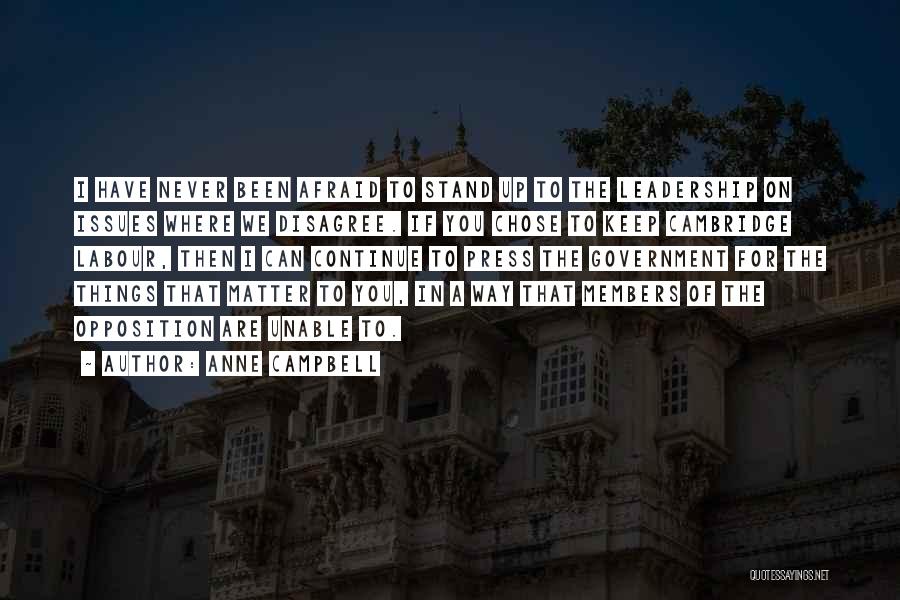
I have never been afraid to stand up to the leadership on issues where we disagree. If you chose to keep Cambridge Labour, then I can continue to press the Government for the things that matter to you, in a way that members of the opposition are unable to. — Anne Campbell
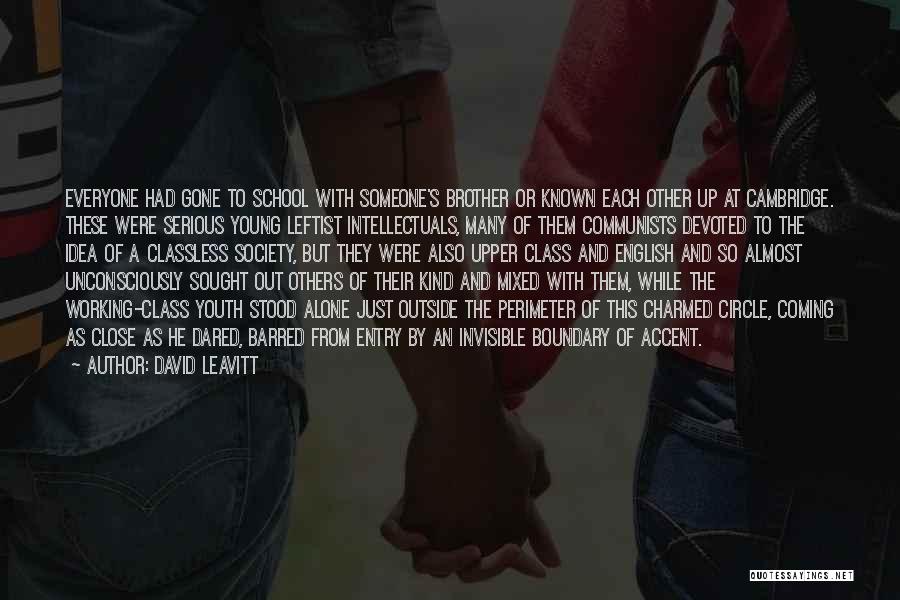
Everyone had gone to school with someone's brother or known each other up at Cambridge. These were serious young leftist intellectuals, many of them communists devoted to the idea of a classless society, but they were also upper class and English and so almost unconsciously sought out others of their kind and mixed with them, while the working-class youth stood alone just outside the perimeter of this charmed circle, coming as close as he dared, barred from entry by an invisible boundary of accent. — David Leavitt
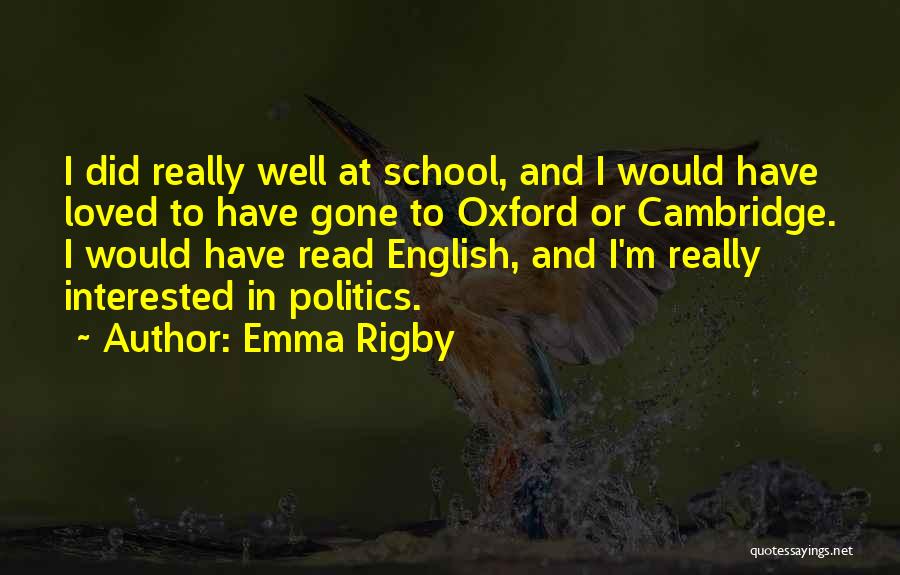
I did really well at school, and I would have loved to have gone to Oxford or Cambridge. I would have read English, and I'm really interested in politics. — Emma Rigby
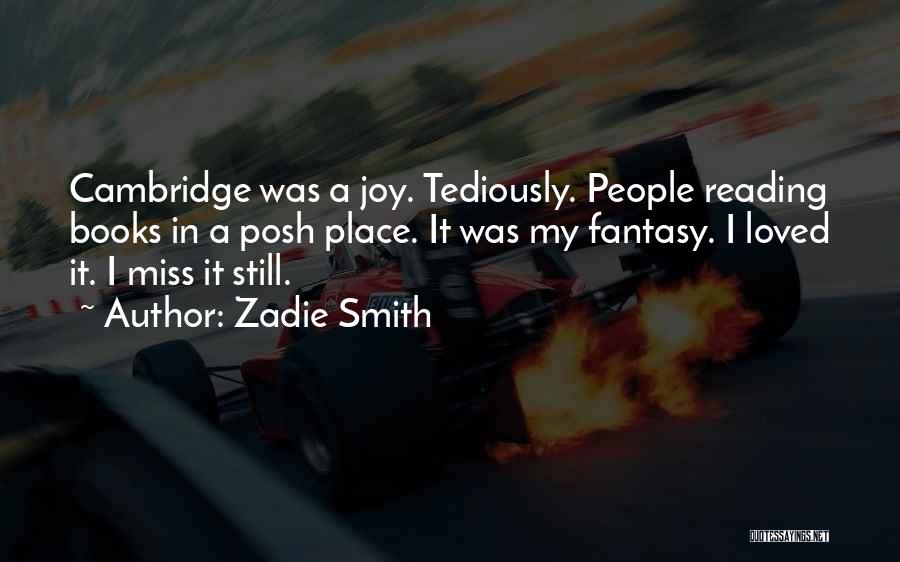
Cambridge was a joy. Tediously. People reading books in a posh place. It was my fantasy. I loved it. I miss it still. — Zadie Smith
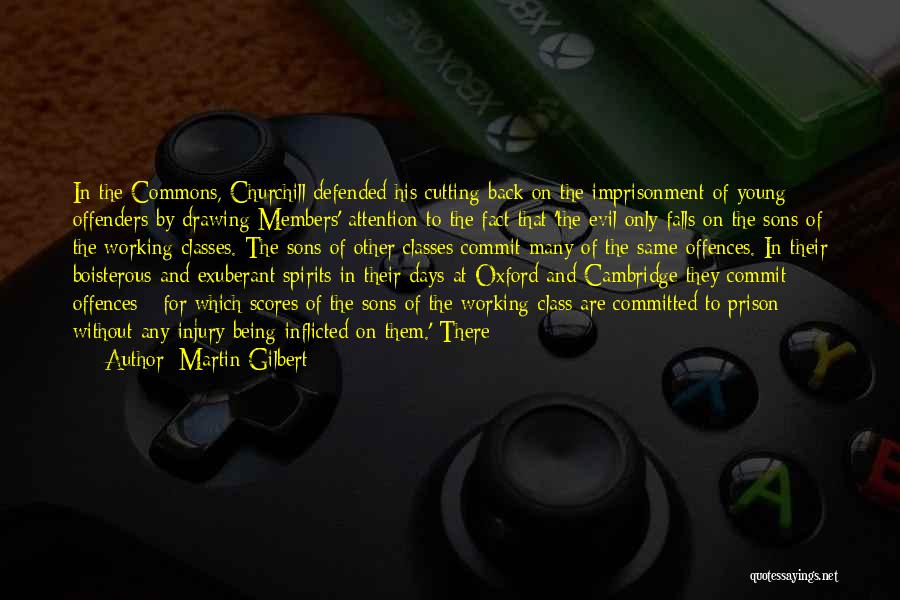
In the Commons, Churchill defended his cutting back on the imprisonment of young offenders by drawing Members' attention to the fact that 'the evil only falls on the sons of the working classes. The sons of other classes commit many of the same offences. In their boisterous and exuberant spirits in their days at Oxford and Cambridge they commit offences - for which scores of the sons of the working class are committed to prison - without any injury being inflicted on them.' There — Martin Gilbert
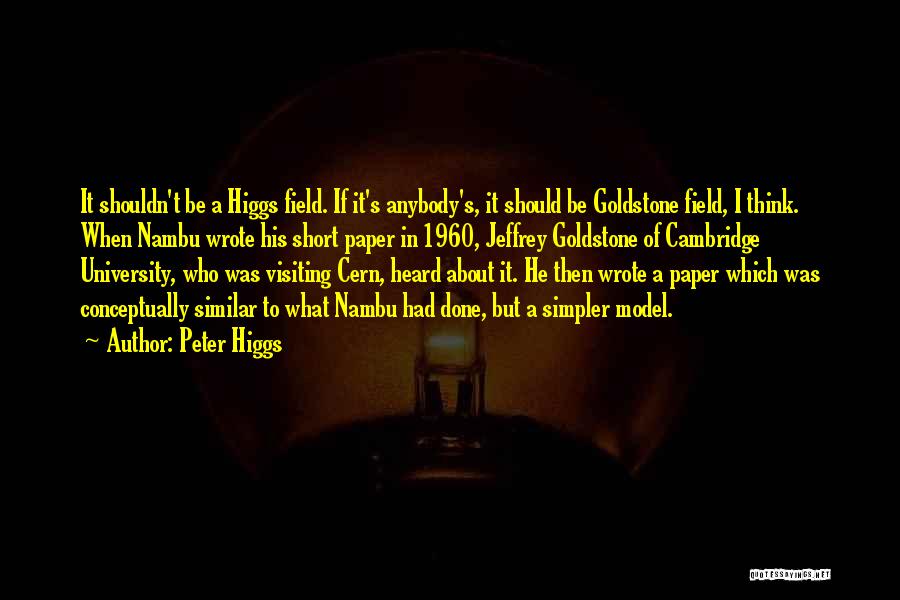
It shouldn't be a Higgs field. If it's anybody's, it should be Goldstone field, I think. When Nambu wrote his short paper in 1960, Jeffrey Goldstone of Cambridge University, who was visiting Cern, heard about it. He then wrote a paper which was conceptually similar to what Nambu had done, but a simpler model. — Peter Higgs
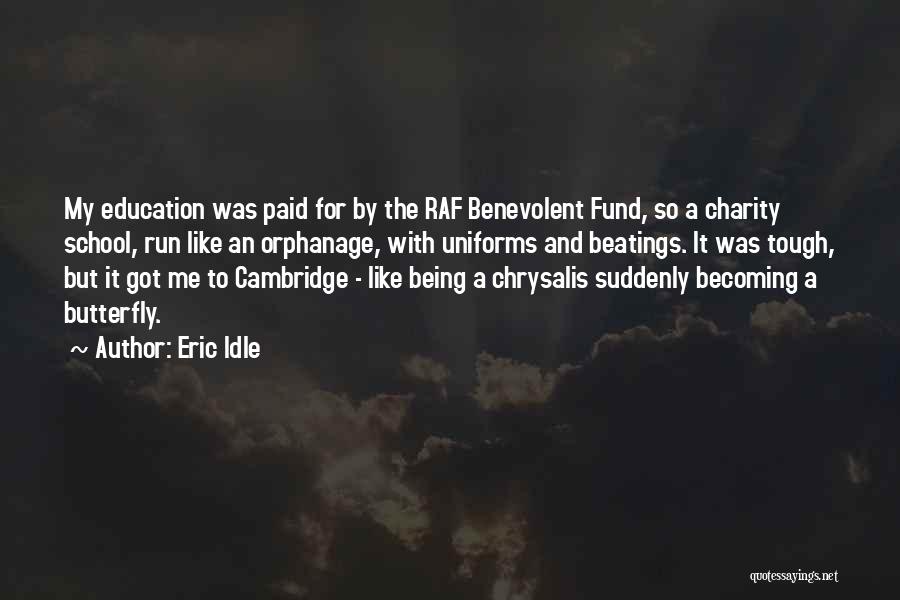
My education was paid for by the RAF Benevolent Fund, so a charity school, run like an orphanage, with uniforms and beatings. It was tough, but it got me to Cambridge - like being a chrysalis suddenly becoming a butterfly. — Eric Idle

When I moved from Cambridge, I donated all my fiction. I carefully cut out pages the authors had autographed for me. I didn't want those autographed books showing up on eBay. — Lois Lowry
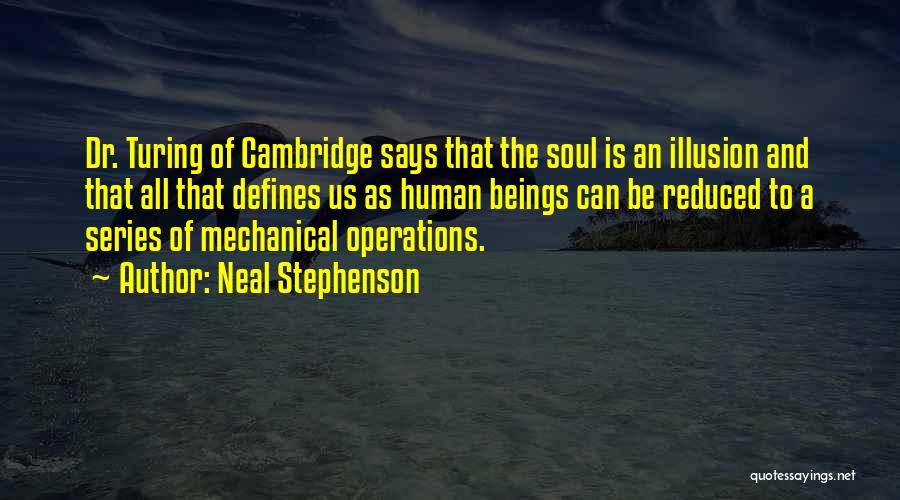
Dr. Turing of Cambridge says that the soul is an illusion and that all that defines us as human beings can be reduced to a series of mechanical operations. — Neal Stephenson
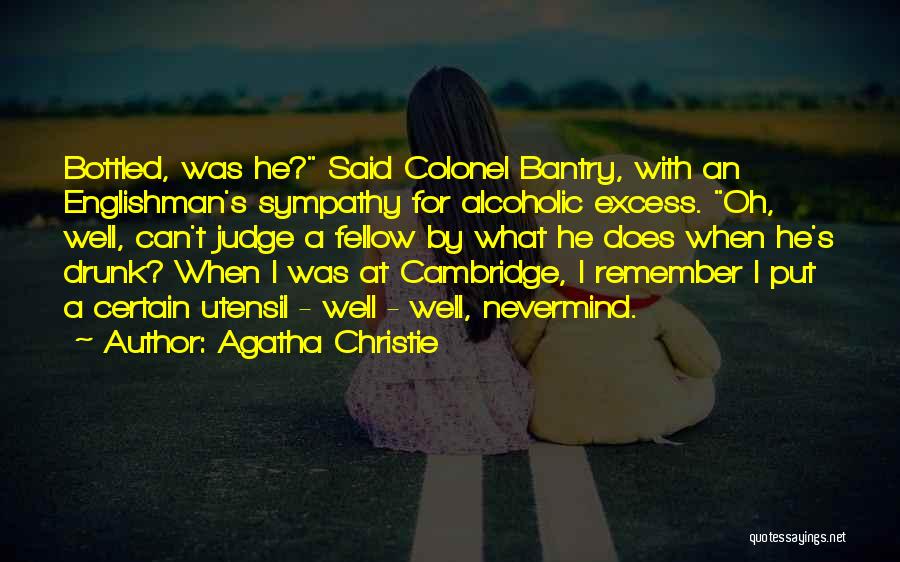
Bottled, was he?" Said Colonel Bantry, with an Englishman's sympathy for alcoholic excess. "Oh, well, can't judge a fellow by what he does when he's drunk? When I was at Cambridge, I remember I put a certain utensil - well - well, nevermind. — Agatha Christie
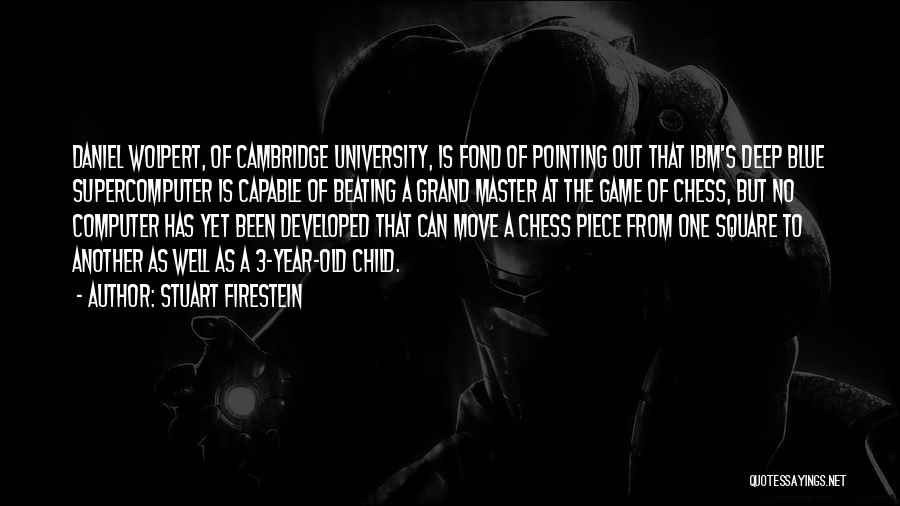
Daniel Wolpert, of Cambridge University, is fond of pointing out that IBM's Deep Blue supercomputer is capable of beating a grand master at the game of chess, but no computer has yet been developed that can move a chess piece from one square to another as well as a 3-year-old child. — Stuart Firestein
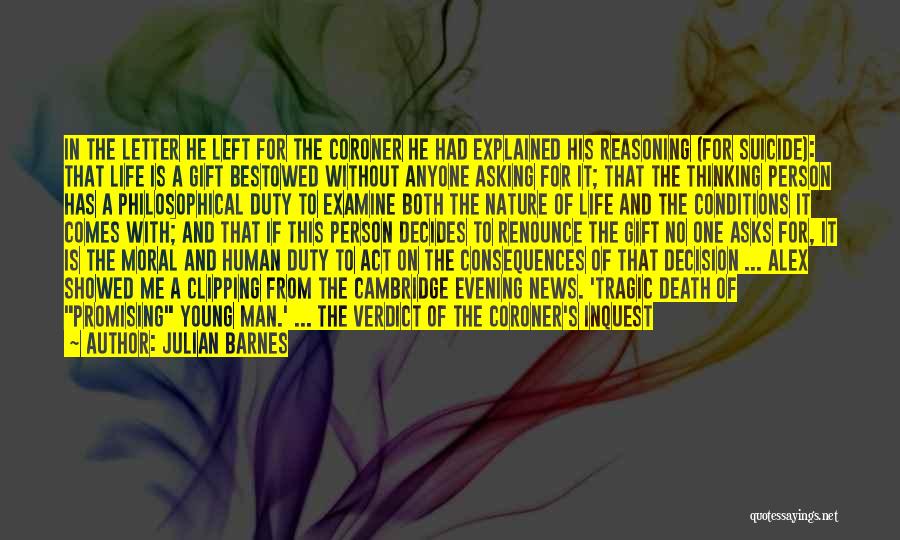
In the letter he left for the coroner he had explained his reasoning (for suicide): that life is a gift bestowed without anyone asking for it; that the thinking person has a philosophical duty to examine both the nature of life and the conditions it comes with; and that if this person decides to renounce the gift no one asks for, it is the moral and human duty to act on the consequences of that decision ... Alex showed me a clipping from the Cambridge Evening News. 'Tragic Death of "Promising" Young Man.' ... The verdict of the coroner's inquest had been that Adrian Flinn (22) had killed himself 'while the balance of his mind was disturbed.' ... The law, and society, and religion all said it was impossible to be sane, healthy, and kill yourself. Perhaps those authorities feared that the suicide's reasoning might impugn the nature and value of life as organised by the state which paid the coroner? — Julian Barnes
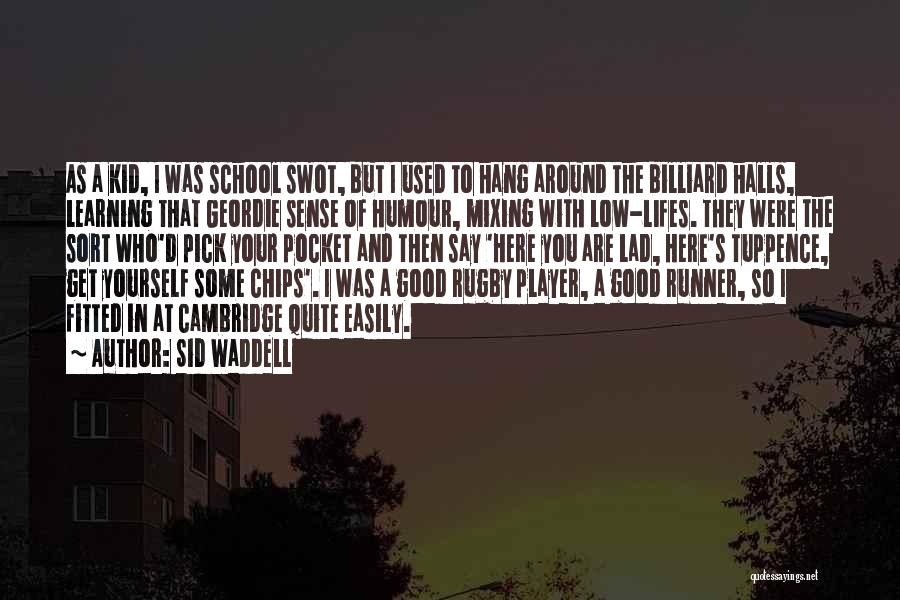
As a kid, I was school swot, but I used to hang around the billiard halls, learning that Geordie sense of humour, mixing with low-lifes. They were the sort who'd pick your pocket and then say 'Here you are lad, here's tuppence, get yourself some chips'. I was a good rugby player, a good runner, so I fitted in at Cambridge quite easily. — Sid Waddell
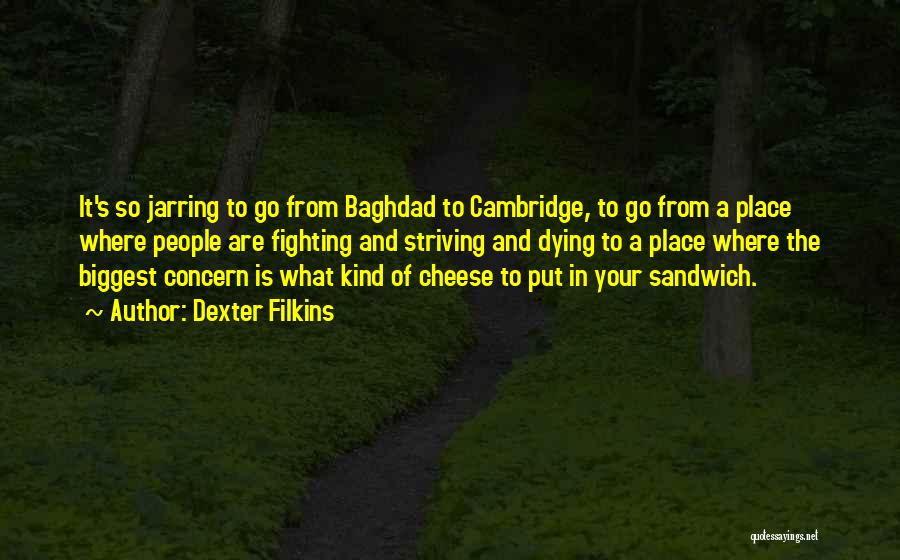
It's so jarring to go from Baghdad to Cambridge, to go from a place where people are fighting and striving and dying to a place where the biggest concern is what kind of cheese to put in your sandwich. — Dexter Filkins
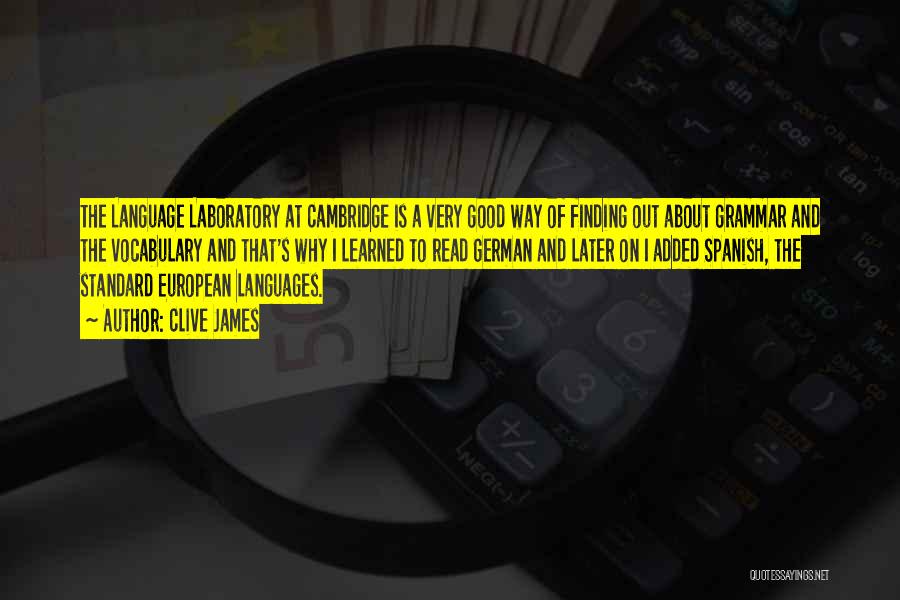
The Language Laboratory at Cambridge is a very good way of finding out about grammar and the vocabulary and that's why I learned to read German and later on I added Spanish, the standard European languages. — Clive James
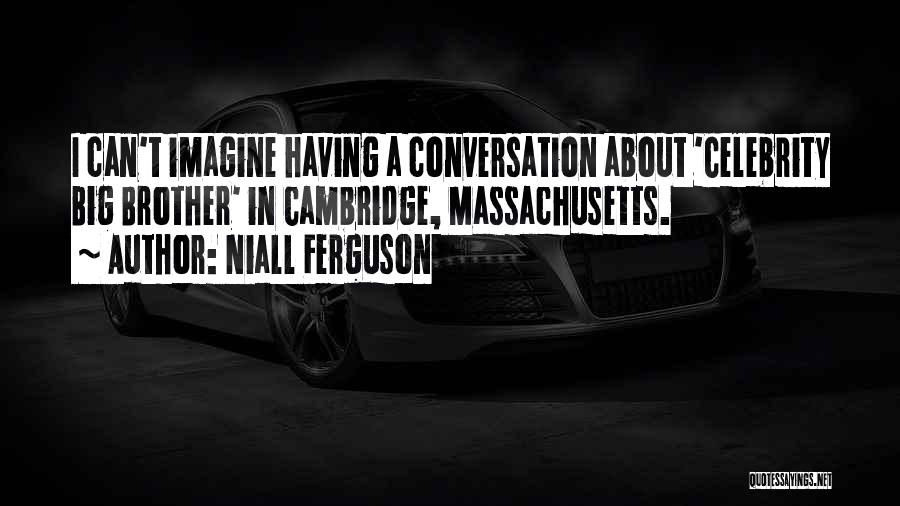
I can't imagine having a conversation about 'Celebrity Big Brother' in Cambridge, Massachusetts. — Niall Ferguson
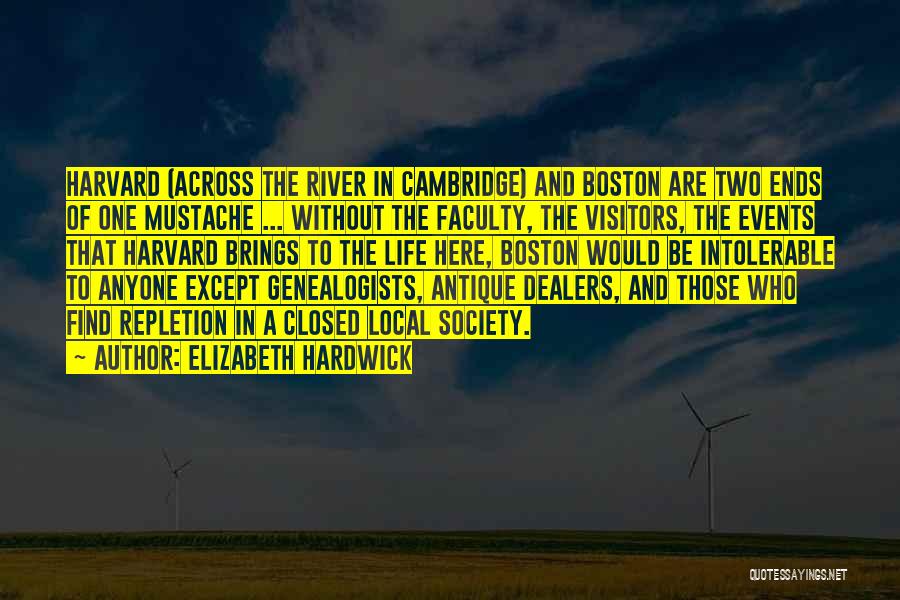
Harvard (across the river in Cambridge) and Boston are two ends of one mustache ... Without the faculty, the visitors, the events that Harvard brings to the life here, Boston would be intolerable to anyone except genealogists, antique dealers, and those who find repletion in a closed local society. — Elizabeth Hardwick
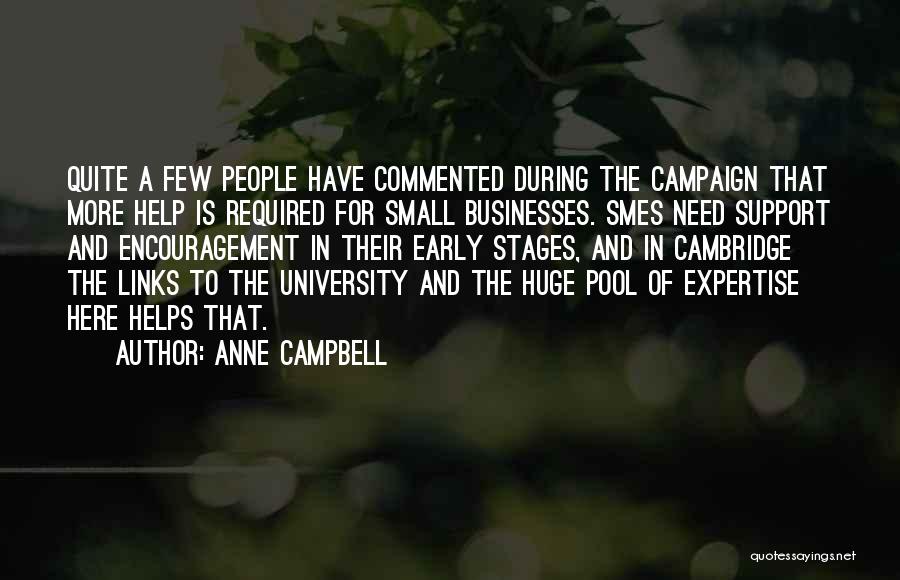
Quite a few people have commented during the campaign that more help is required for small businesses. SMEs need support and encouragement in their early stages, and in Cambridge the links to the University and the huge pool of expertise here helps that. — Anne Campbell
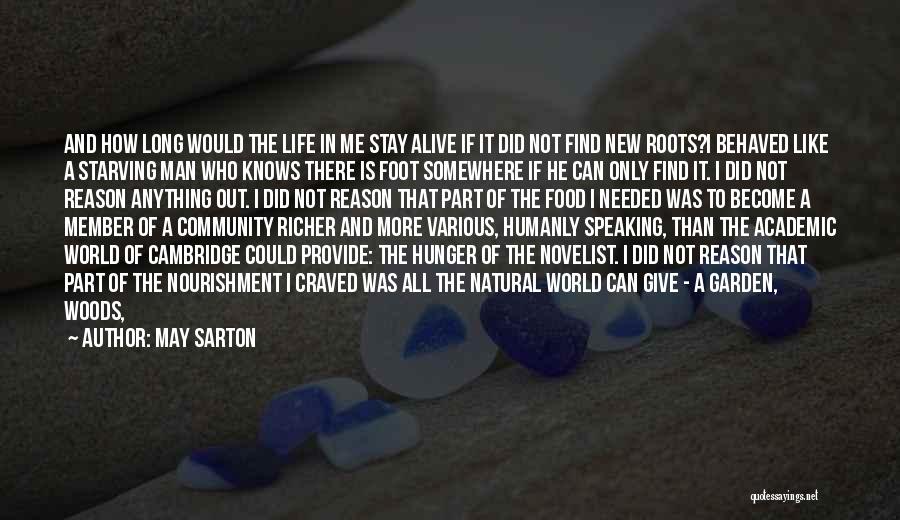
And how long would the life in me stay alive if it did not find new roots?
I behaved like a starving man who knows there is foot somewhere if he can only find it. I did not reason anything out. I did not reason that part of the food I needed was to become a member of a community richer and more various, humanly speaking, than the academic world of Cambridge could provide: the hunger of the novelist. I did not reason that part of the nourishment I craved was all the natural world can give - a garden, woods, fields, brooks, birds: the hunger of the poet. I did not reason that the time had come when I needed a house of my own, a nest of my own making: the hunger of the woman. — May Sarton
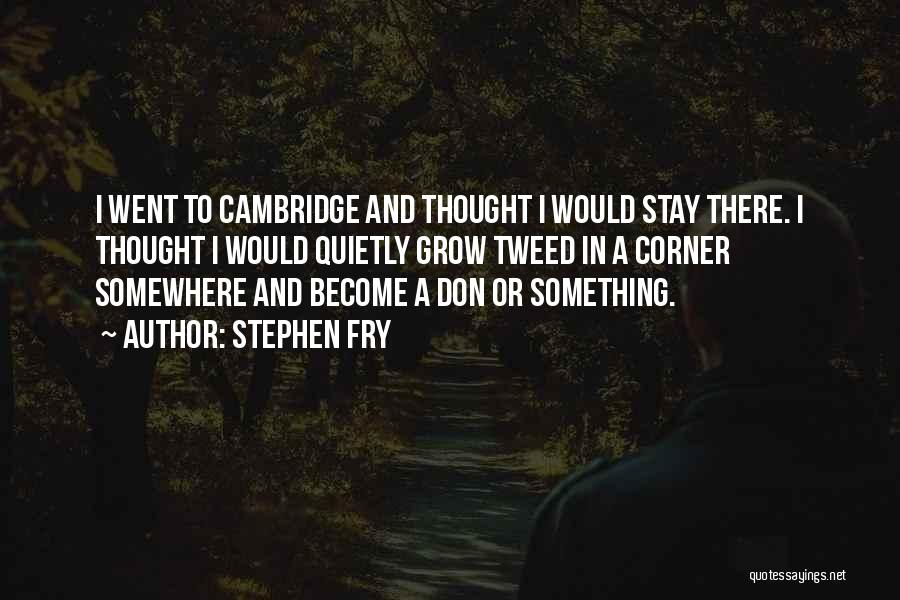
I went to Cambridge and thought I would stay there. I thought I would quietly grow tweed in a corner somewhere and become a Don or something. — Stephen Fry
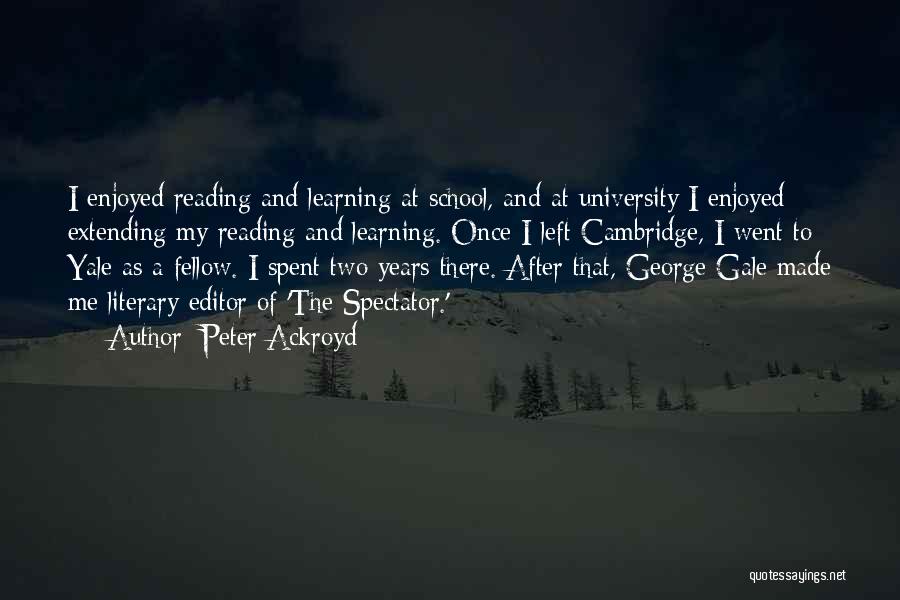
I enjoyed reading and learning at school, and at university I enjoyed extending my reading and learning. Once I left Cambridge, I went to Yale as a fellow. I spent two years there. After that, George Gale made me literary editor of 'The Spectator.' — Peter Ackroyd
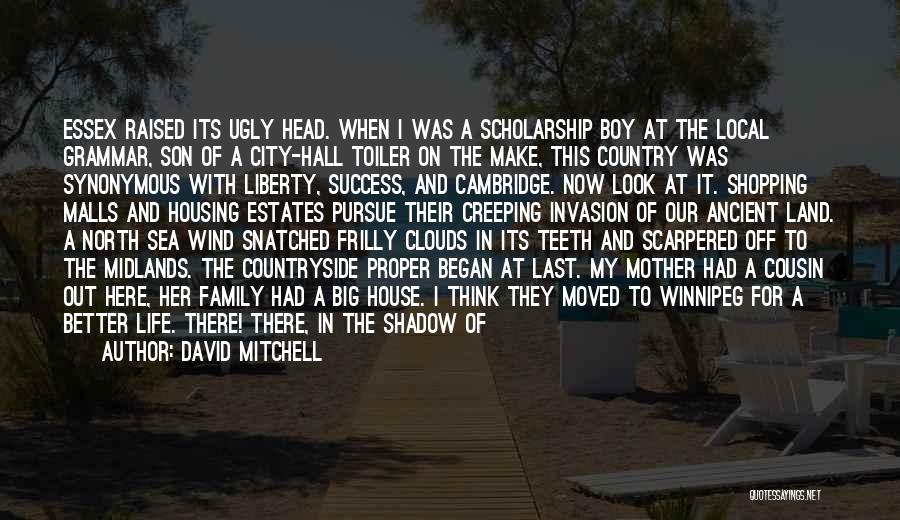
Essex raised its ugly head. When i was a scholarship boy at the local grammar, son of a city-hall toiler on the make, this country was synonymous with liberty, success, and Cambridge. Now look at it. Shopping malls and housing estates pursue their creeping invasion of our ancient land. A North Sea wind snatched frilly clouds in its teeth and scarpered off to the midlands. The countryside proper began at last. My mother had a cousin out here, her family had a big house. I think they moved to Winnipeg for a better life. There! There, in the shadow of that DIY warehouse, once stood a row of walnut trees where me and Pip Oakes - a childhood chum who died aged thirteen under the wheels of an oil tanker - varnished a canoe one summer and sailed it alone the Say. Sticklebacks in jars,. There, right there, around that bend we lit a fire and cooked beans and potatoes wrapped in silver foil! Come back, oh, come back! Is one glimpse all I get? — David Mitchell
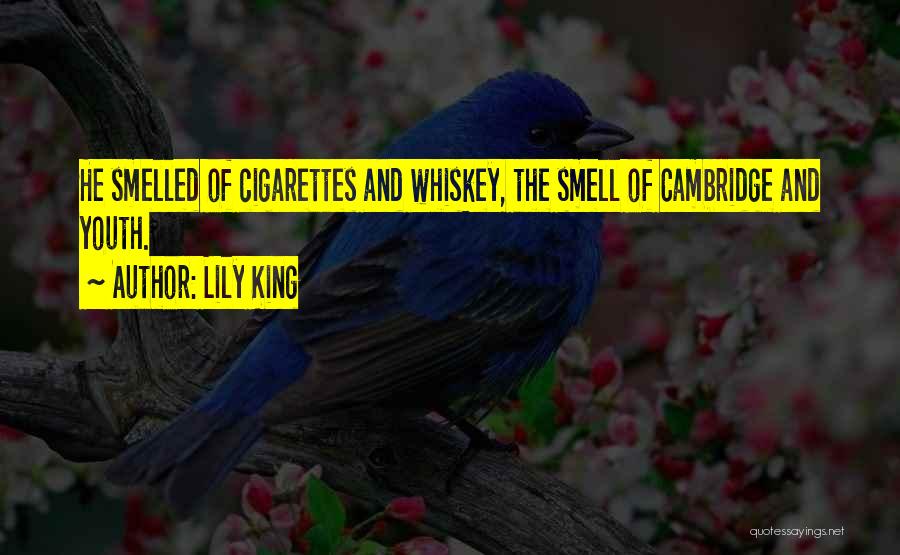
He smelled of cigarettes and whiskey, the smell of Cambridge and youth. — Lily King
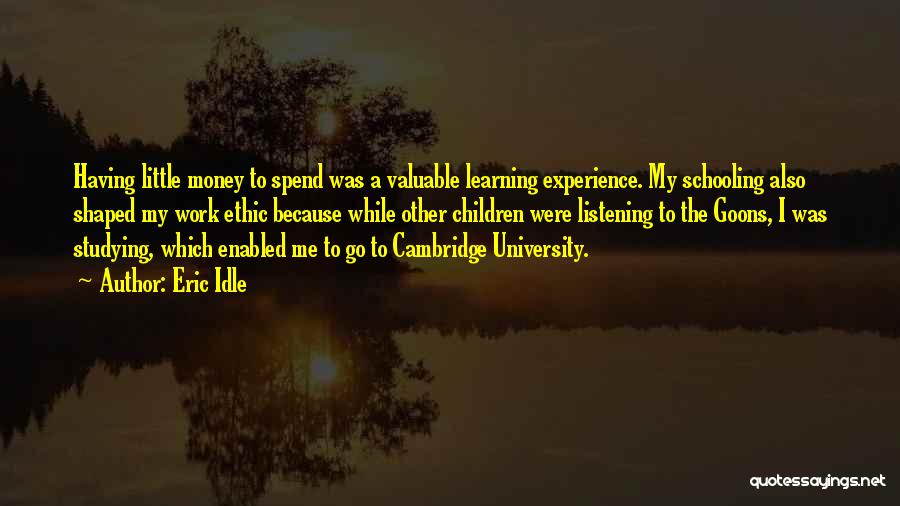
Having little money to spend was a valuable learning experience. My schooling also shaped my work ethic because while other children were listening to the Goons, I was studying, which enabled me to go to Cambridge University. — Eric Idle
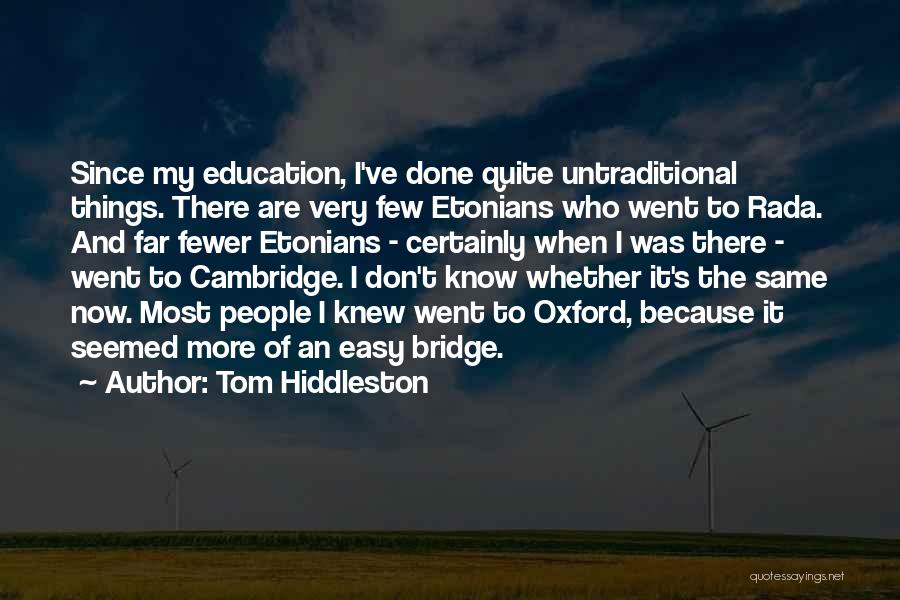
Since my education, I've done quite untraditional things. There are very few Etonians who went to Rada. And far fewer Etonians - certainly when I was there - went to Cambridge. I don't know whether it's the same now. Most people I knew went to Oxford, because it seemed more of an easy bridge. — Tom Hiddleston
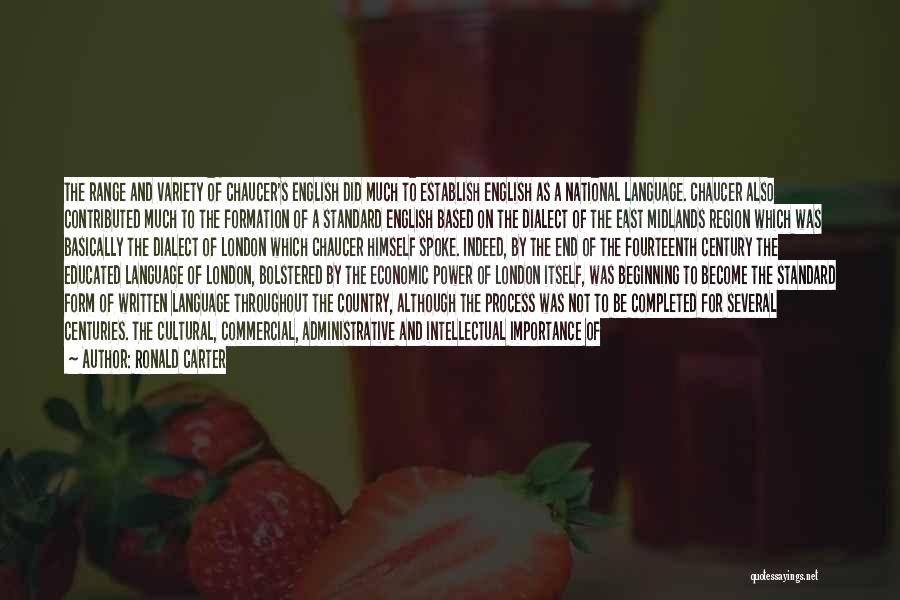
The range and variety of Chaucer's English did much to establish English as a national language. Chaucer also contributed much to the formation of a standard English based on the dialect of the East Midlands region which was basically the dialect of London which Chaucer himself spoke. Indeed, by the end of the fourteenth century the educated language of London, bolstered by the economic power of London itself, was beginning to become the standard form of written language throughout the country, although the process was not to be completed for several centuries. The cultural, commercial, administrative and intellectual importance of the East Midlands (one of the two main universities, Cambridge, was also in this region), the agricultural richness of the region and the presence of major cities, Norwich and London, contributed much to the increasing standardisation of the dialect. — Ronald Carter
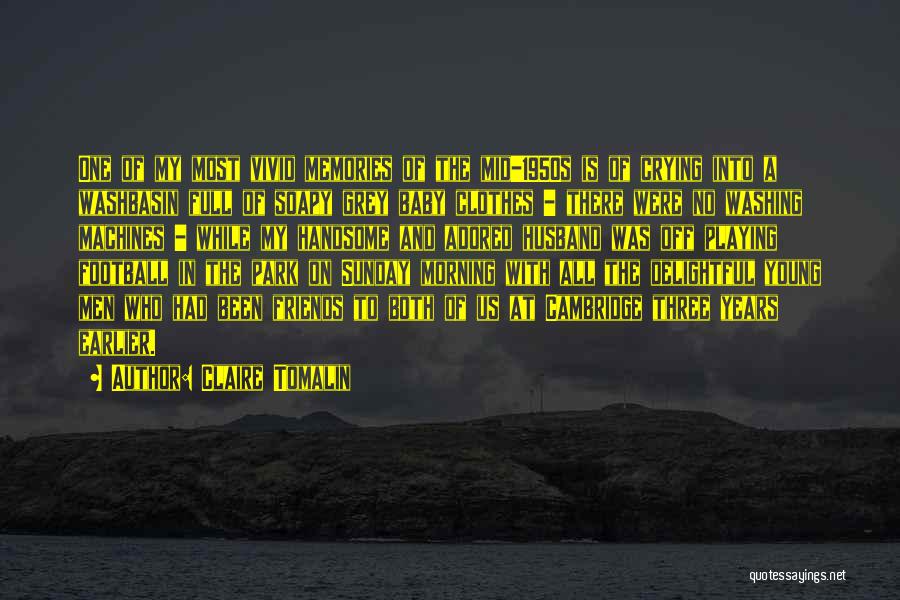
One of my most vivid memories of the mid-1950s is of crying into a washbasin full of soapy grey baby clothes - there were no washing machines - while my handsome and adored husband was off playing football in the park on Sunday morning with all the delightful young men who had been friends to both of us at Cambridge three years earlier. — Claire Tomalin
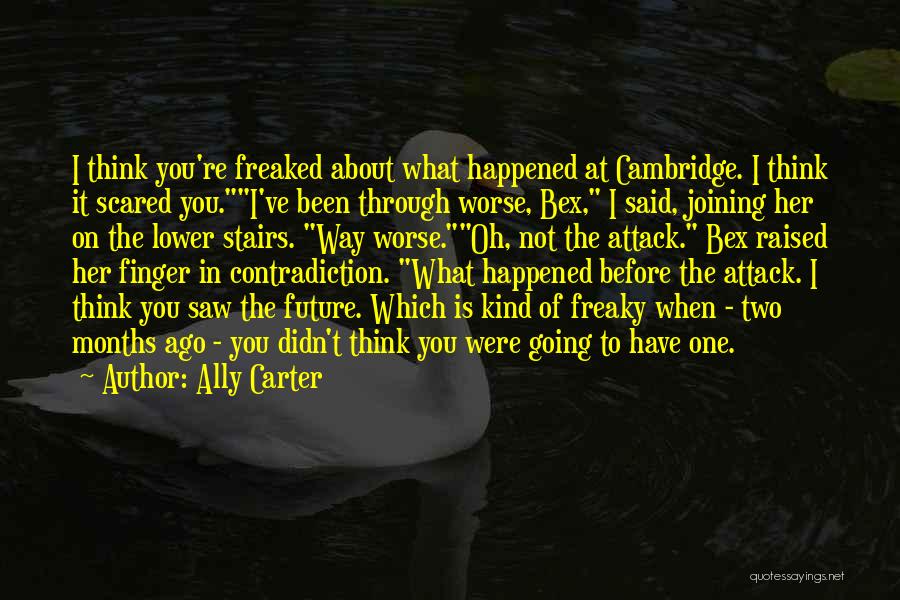
I think you're freaked about what happened at Cambridge. I think it scared you."
"I've been through worse, Bex," I said, joining her on the lower stairs. "Way worse."
"Oh, not the attack." Bex raised her finger in contradiction. "What happened before the attack. I think you saw the future. Which is kind of freaky when - two months ago - you didn't think you were going to have one. — Ally Carter
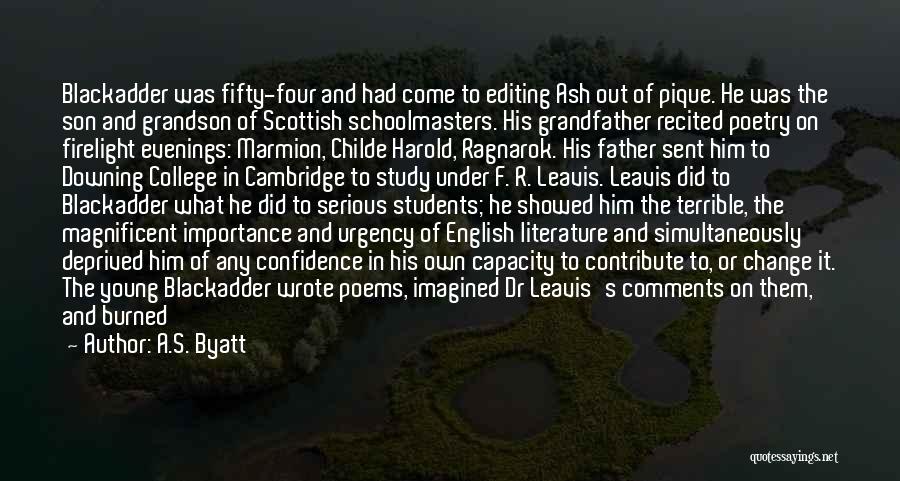
Blackadder was fifty-four and had come to editing Ash out of pique. He was the son and grandson of Scottish schoolmasters. His grandfather recited poetry on firelight evenings: Marmion, Childe Harold, Ragnarok. His father sent him to Downing College in Cambridge to study under F. R. Leavis. Leavis did to Blackadder what he did to serious students; he showed him the terrible, the magnificent importance and urgency of English literature and simultaneously deprived him of any confidence in his own capacity to contribute to, or change it. The young Blackadder wrote poems, imagined Dr Leavis's comments on them, and burned them. — A.S. Byatt
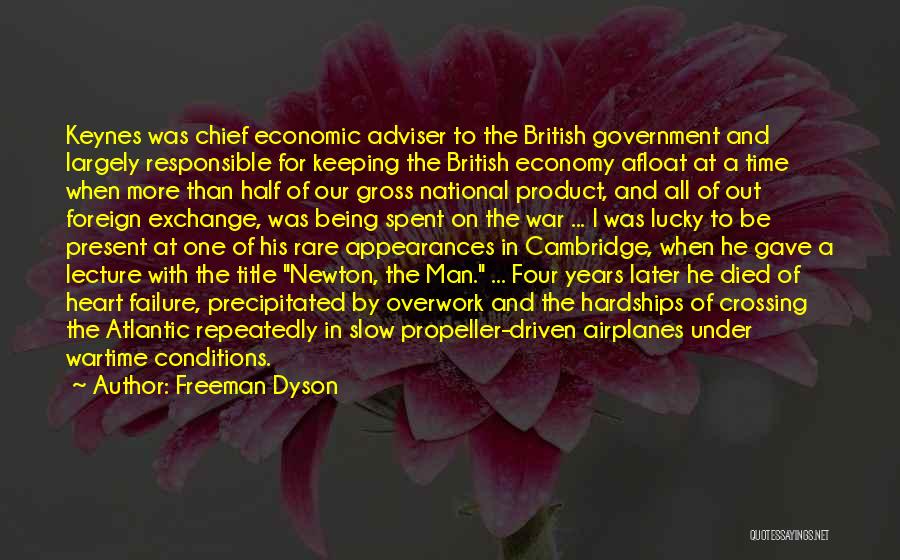
Keynes was chief economic adviser to the British government and largely responsible for keeping the British economy afloat at a time when more than half of our gross national product, and all of out foreign exchange, was being spent on the war ... I was lucky to be present at one of his rare appearances in Cambridge, when he gave a lecture with the title "Newton, the Man." ... Four years later he died of heart failure, precipitated by overwork and the hardships of crossing the Atlantic repeatedly in slow propeller-driven airplanes under wartime conditions. — Freeman Dyson
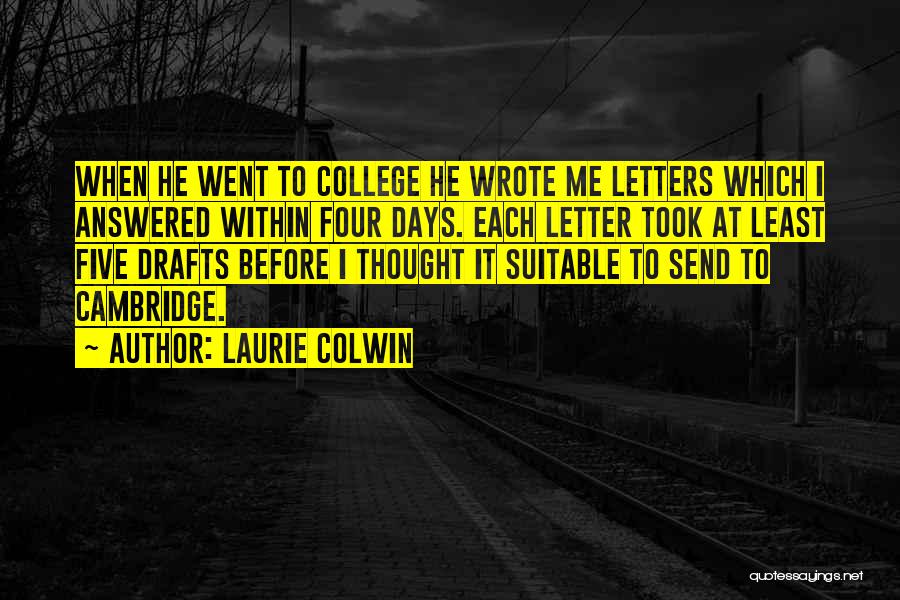
When he went to college he wrote me letters which I answered within four days. Each letter took at least five drafts before I thought it suitable to send to Cambridge. — Laurie Colwin
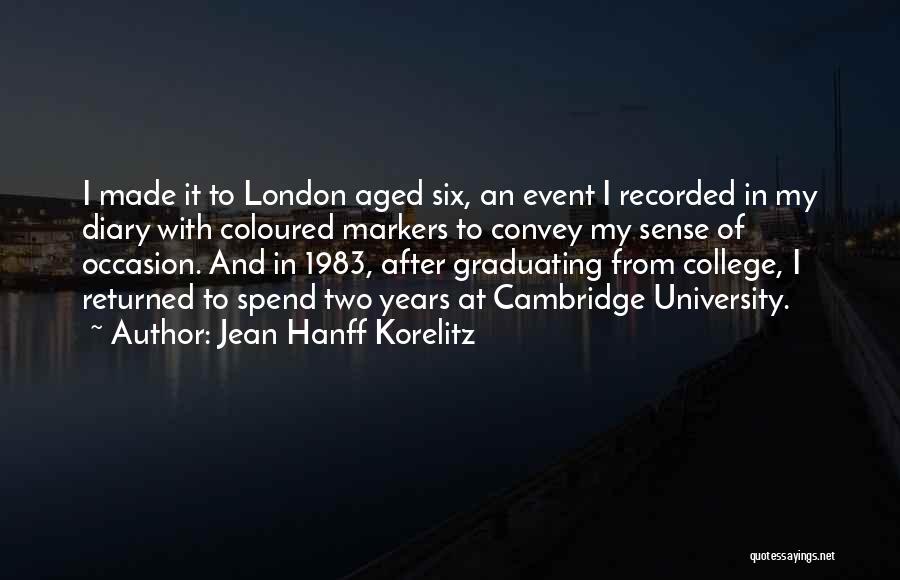
I made it to London aged six, an event I recorded in my diary with coloured markers to convey my sense of occasion. And in 1983, after graduating from college, I returned to spend two years at Cambridge University. — Jean Hanff Korelitz
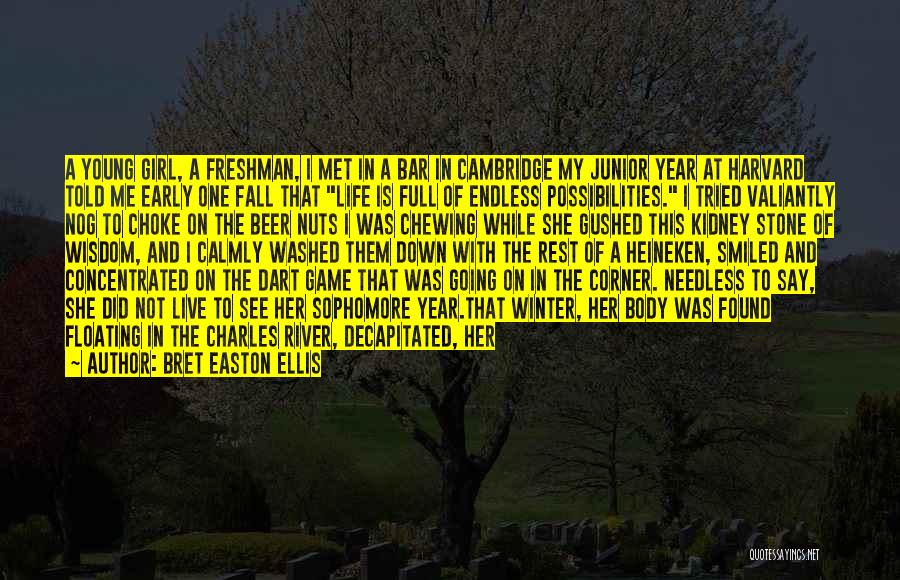
A young girl, a freshman, I met in a bar in Cambridge my junior year at Harvard told me early one fall that "Life is full of endless possibilities." I tried valiantly nog to choke on the beer nuts I was chewing while she gushed this kidney stone of wisdom, and I calmly washed them down with the rest of a Heineken, smiled and concentrated on the dart game that was going on in the corner. Needless to say, she did not live to see her sophomore year.That winter, her body was found floating in the Charles River, decapitated, her head hung from a tree on the bank, her hair knotted around a low-hanging branch, three miles away. — Bret Easton Ellis
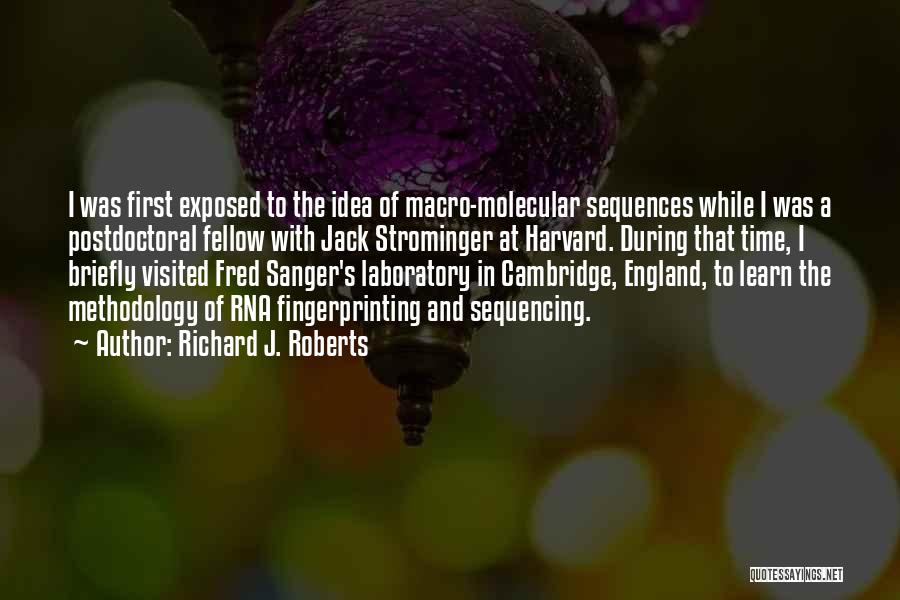
I was first exposed to the idea of macro-molecular sequences while I was a postdoctoral fellow with Jack Strominger at Harvard. During that time, I briefly visited Fred Sanger's laboratory in Cambridge, England, to learn the methodology of RNA fingerprinting and sequencing. — Richard J. Roberts
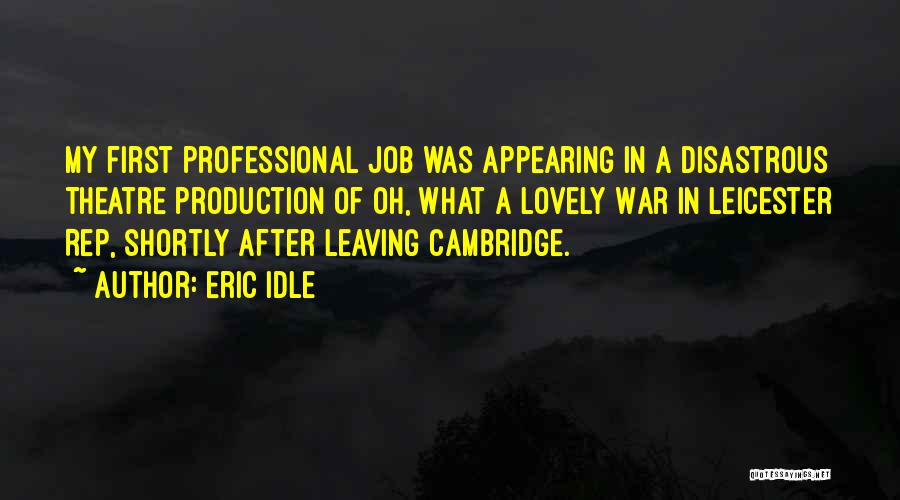
My first professional job was appearing in a disastrous theatre production of Oh, What a Lovely War in Leicester Rep, shortly after leaving Cambridge. — Eric Idle
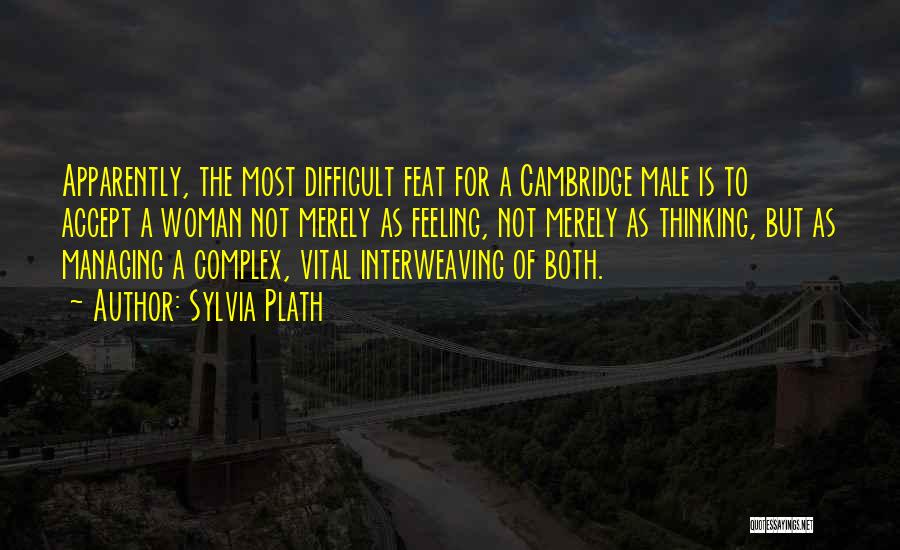
Apparently, the most difficult feat for a Cambridge male is to accept a woman not merely as feeling, not merely as thinking, but as managing a complex, vital interweaving of both. — Sylvia Plath
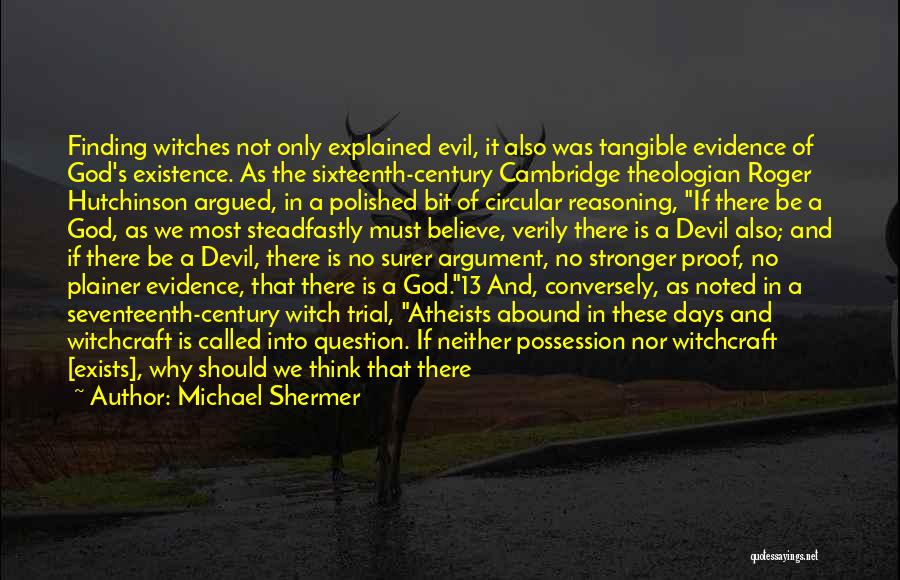
Finding witches not only explained evil, it also was tangible evidence of God's existence. As the sixteenth-century Cambridge theologian Roger Hutchinson argued, in a polished bit of circular reasoning, "If there be a God, as we most steadfastly must believe, verily there is a Devil also; and if there be a Devil, there is no surer argument, no stronger proof, no plainer evidence, that there is a God."13 And, conversely, as noted in a seventeenth-century witch trial, "Atheists abound in these days and witchcraft is called into question. If neither possession nor witchcraft [exists], why should we think that there are devils? If no devils, no God. — Michael Shermer
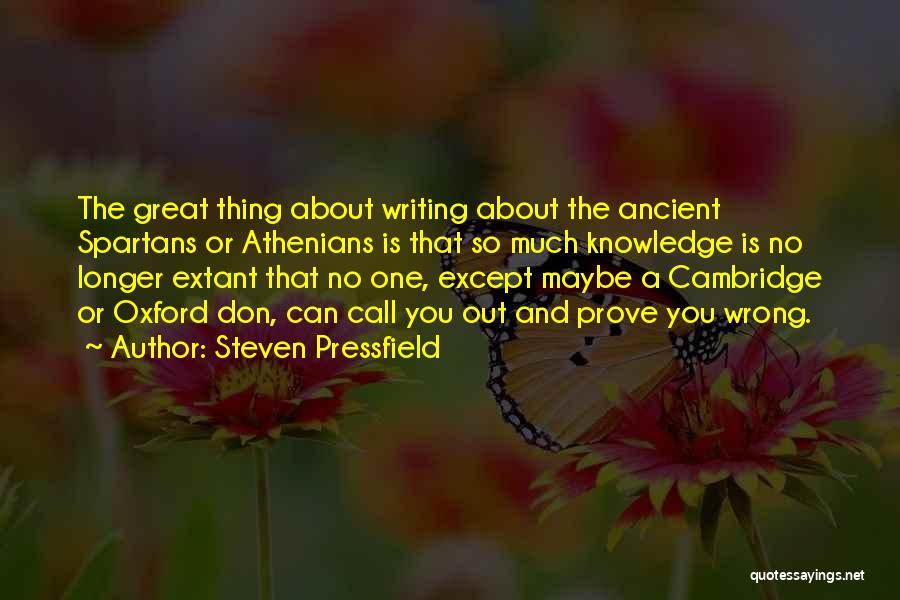
The great thing about writing about the ancient Spartans or Athenians is that so much knowledge is no longer extant that no one, except maybe a Cambridge or Oxford don, can call you out and prove you wrong. — Steven Pressfield
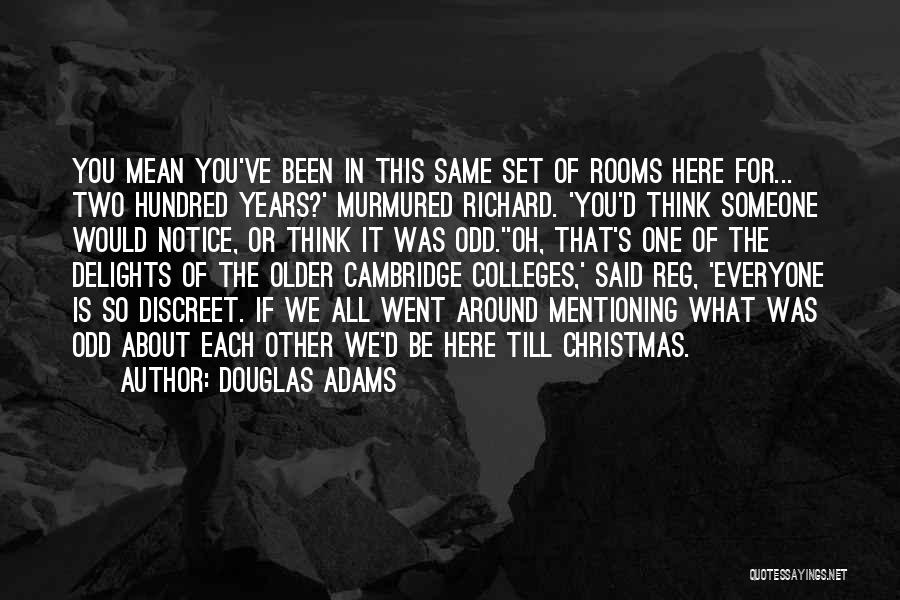
You mean you've been in this same set of rooms here for... two hundred years?' murmured Richard. 'You'd think someone would notice, or think it was odd.'
'Oh, that's one of the delights of the older Cambridge colleges,' said Reg, 'everyone is so discreet. If we all went around mentioning what was odd about each other we'd be here till Christmas. — Douglas Adams
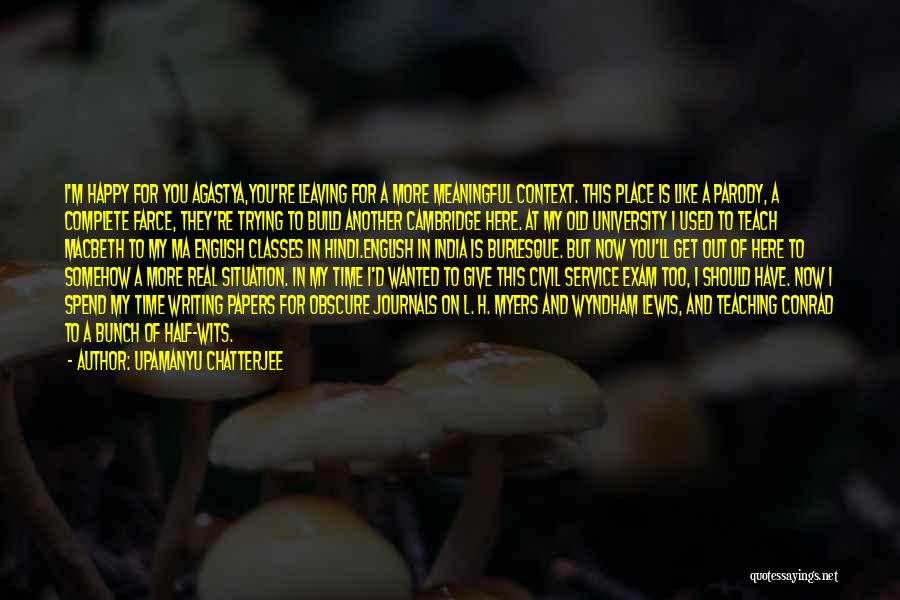
I'm happy for you Agastya,you're leaving for a more meaningful context. This place is like a parody, a complete farce, they're trying to build another Cambridge here. At my old University I used to teach Macbeth to my MA English classes in Hindi.English in India is burlesque. But now you'll get out of here to somehow a more real situation. In my time I'd wanted to give this Civil Service exam too, I should have. Now I spend my time writing papers for obscure journals on L. H. Myers and Wyndham Lewis, and teaching Conrad to a bunch of half-wits. — Upamanyu Chatterjee
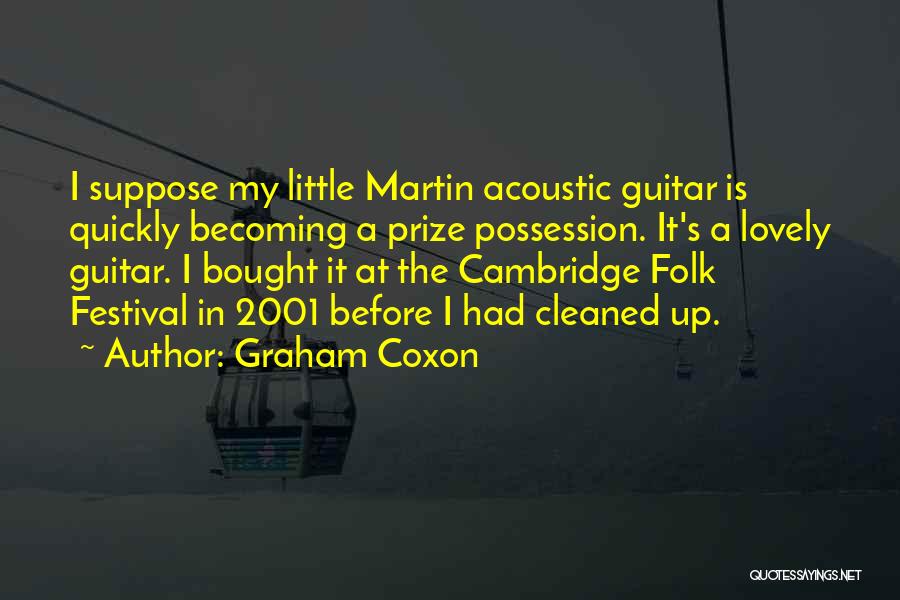
I suppose my little Martin acoustic guitar is quickly becoming a prize possession. It's a lovely guitar. I bought it at the Cambridge Folk Festival in 2001 before I had cleaned up. — Graham Coxon
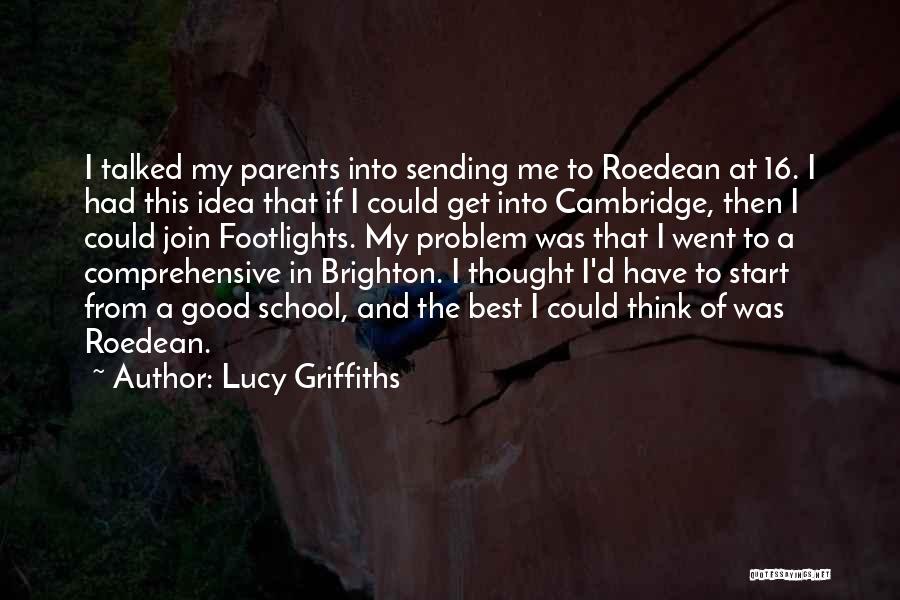
I talked my parents into sending me to Roedean at 16. I had this idea that if I could get into Cambridge, then I could join Footlights. My problem was that I went to a comprehensive in Brighton. I thought I'd have to start from a good school, and the best I could think of was Roedean. — Lucy Griffiths
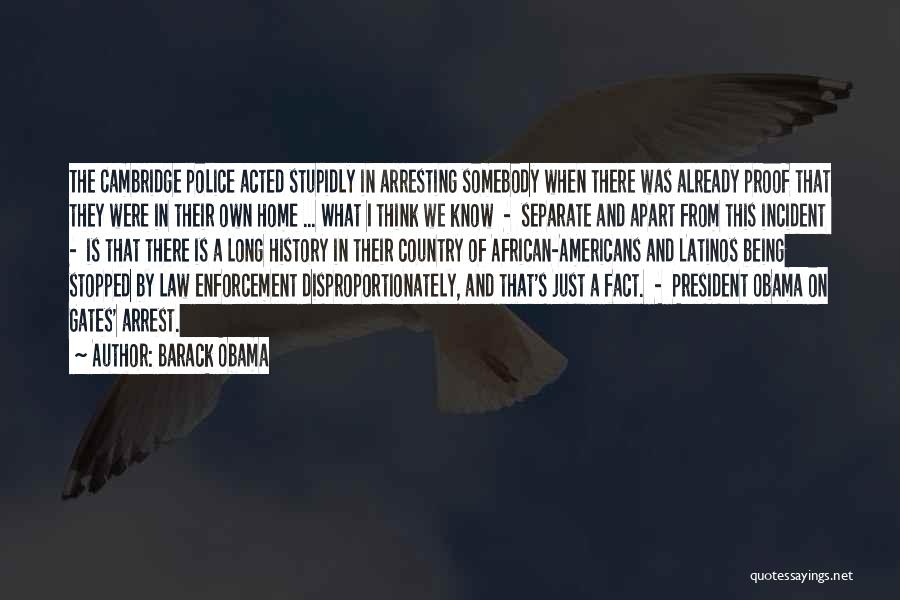
The Cambridge police acted stupidly in arresting somebody when there was already proof that they were in their own home ... What I think we know - separate and apart from this incident - is that there is a long history in their country of African-Americans and Latinos being stopped by law enforcement disproportionately, and that's just a fact. - President Obama on Gates' arrest. — Barack Obama
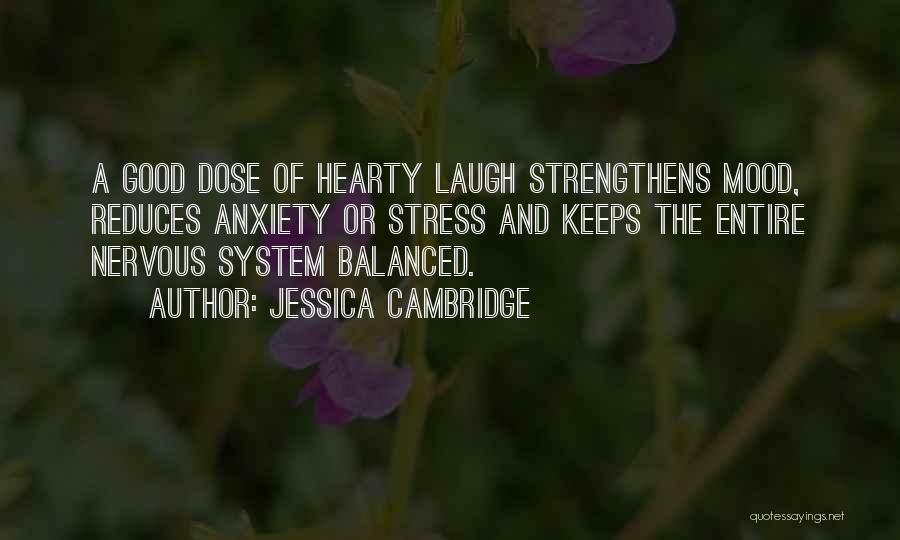
A good dose of hearty laugh strengthens mood, reduces anxiety or stress and keeps the entire nervous system balanced. — Jessica Cambridge
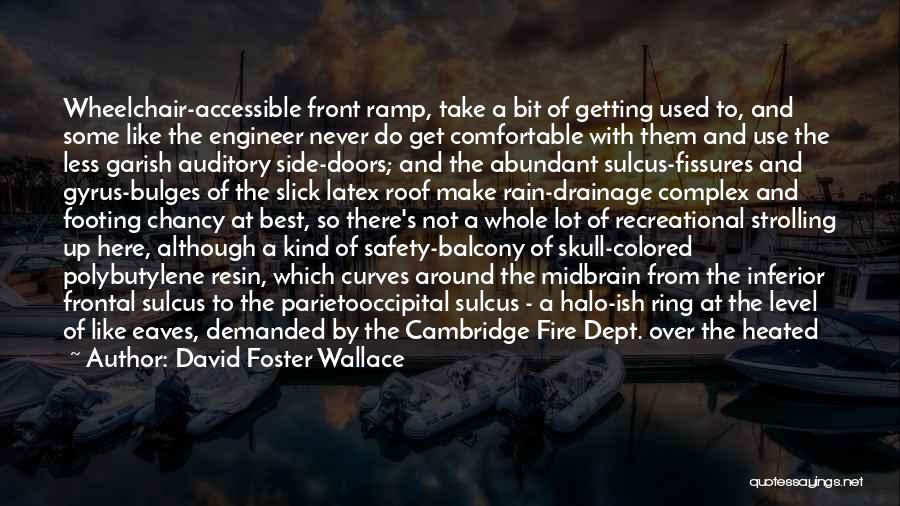
Wheelchair-accessible front ramp, take a bit of getting used to, and some like the engineer never do get comfortable with them and use the less garish auditory side-doors; and the abundant sulcus-fissures and gyrus-bulges of the slick latex roof make rain-drainage complex and footing chancy at best, so there's not a whole lot of recreational strolling up here, although a kind of safety-balcony of skull-colored polybutylene resin, which curves around the midbrain from the inferior frontal sulcus to the parietooccipital sulcus - a halo-ish ring at the level of like eaves, demanded by the Cambridge Fire Dept. over the heated pro-mimetic protests of topological Rickeyites over in the Architecture Dept. (which the M.I.T. administration, trying to placate Rickeyites and C.F.D. Fire Marshal both, had had the pre-molded resin injected with dyes to render it the distinctively icky brown-shot off-white of living skull, so that the balcony resembles at once corporeal bone and — David Foster Wallace
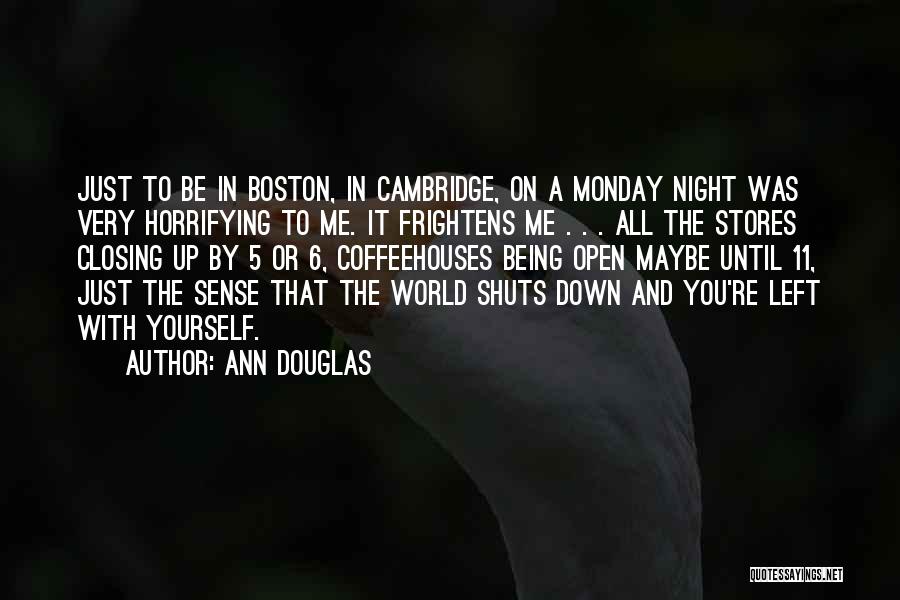
Just to be in Boston, in Cambridge, on a Monday night was very horrifying to me. It frightens me . . . All the stores closing up by 5 or 6, coffeehouses being open maybe until 11, just the sense that the world shuts down and you're left with yourself. — Ann Douglas
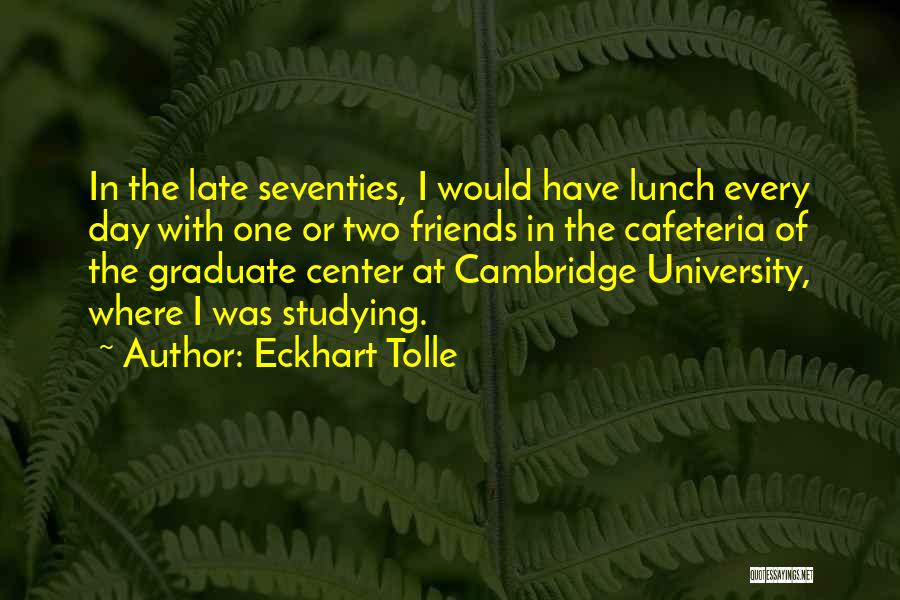
In the late seventies, I would have lunch every day with one or two friends in the cafeteria of the graduate center at Cambridge University, where I was studying. — Eckhart Tolle
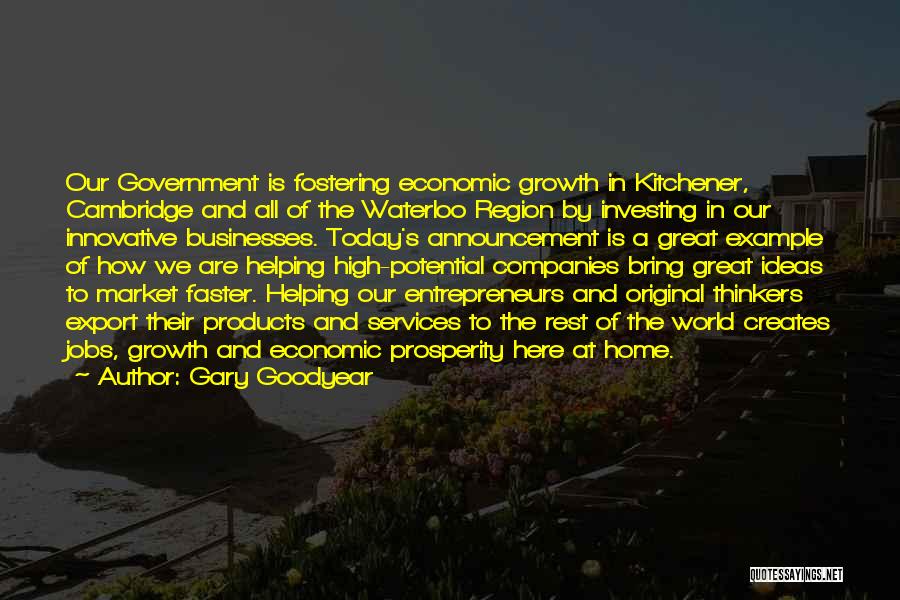
Our Government is fostering economic growth in Kitchener, Cambridge and all of the Waterloo Region by investing in our innovative businesses. Today's announcement is a great example of how we are helping high-potential companies bring great ideas to market faster. Helping our entrepreneurs and original thinkers export their products and services to the rest of the world creates jobs, growth and economic prosperity here at home. — Gary Goodyear
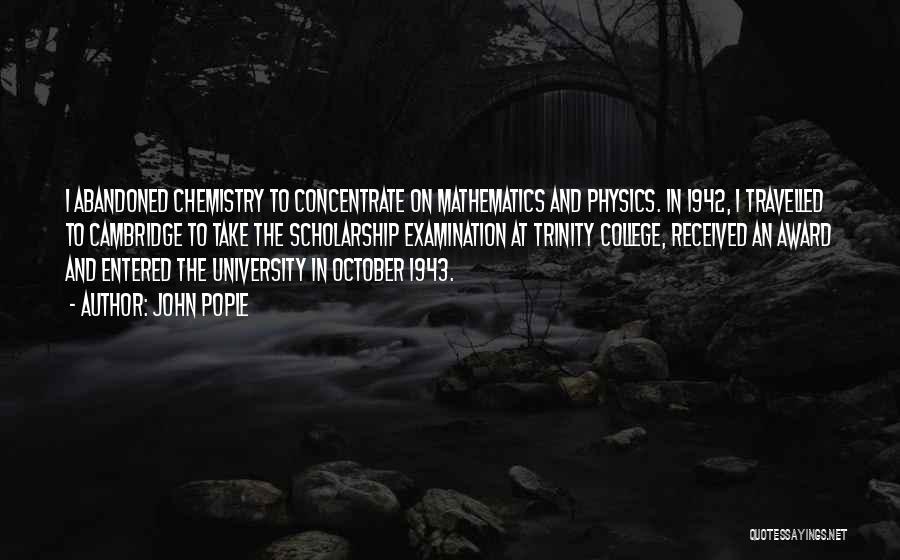
I abandoned chemistry to concentrate on mathematics and physics. In 1942, I travelled to Cambridge to take the scholarship examination at Trinity College, received an award and entered the university in October 1943. — John Pople
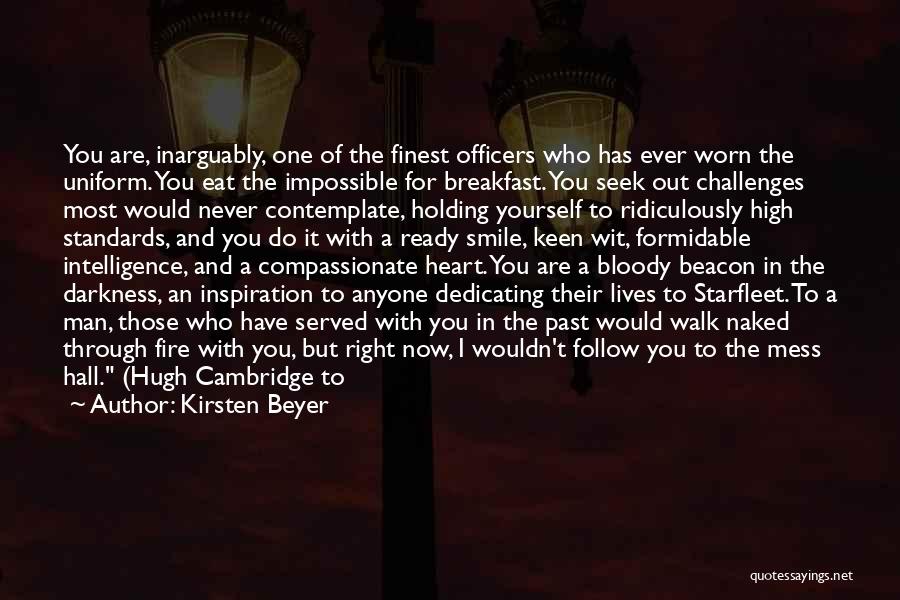
You are, inarguably, one of the finest officers who has ever worn the uniform. You eat the impossible for breakfast. You seek out challenges most would never contemplate, holding yourself to ridiculously high standards, and you do it with a ready smile, keen wit, formidable intelligence, and a compassionate heart. You are a bloody beacon in the darkness, an inspiration to anyone dedicating their lives to Starfleet. To a man, those who have served with you in the past would walk naked through fire with you, but right now, I wouldn't follow you to the mess hall." (Hugh Cambridge to Kathryn Janeway). — Kirsten Beyer
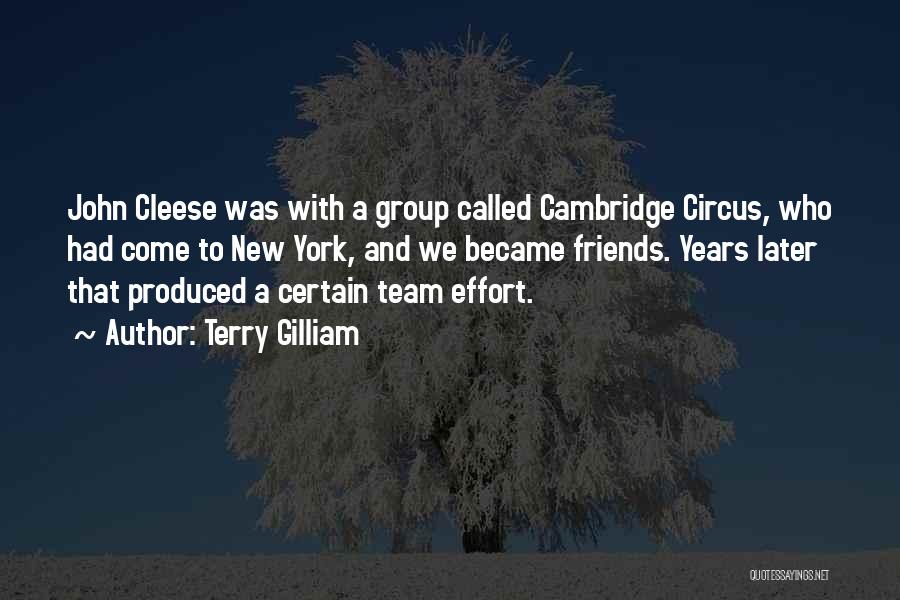
John Cleese was with a group called Cambridge Circus, who had come to New York, and we became friends. Years later that produced a certain team effort. — Terry Gilliam
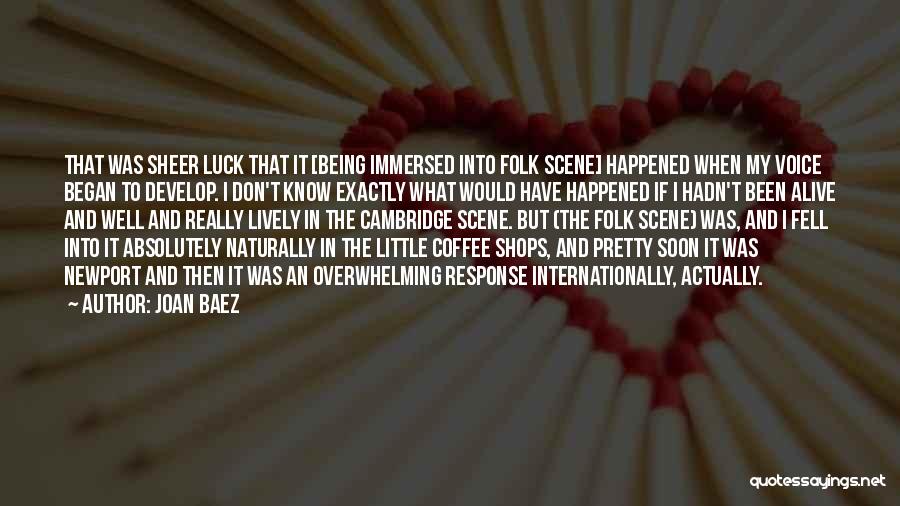
That was sheer luck that it [being immersed into folk scene] happened when my voice began to develop. I don't know exactly what would have happened if I hadn't been alive and well and really lively in the Cambridge scene. But (the folk scene) was, and I fell into it absolutely naturally in the little coffee shops, and pretty soon it was Newport and then it was an overwhelming response internationally, actually. — Joan Baez
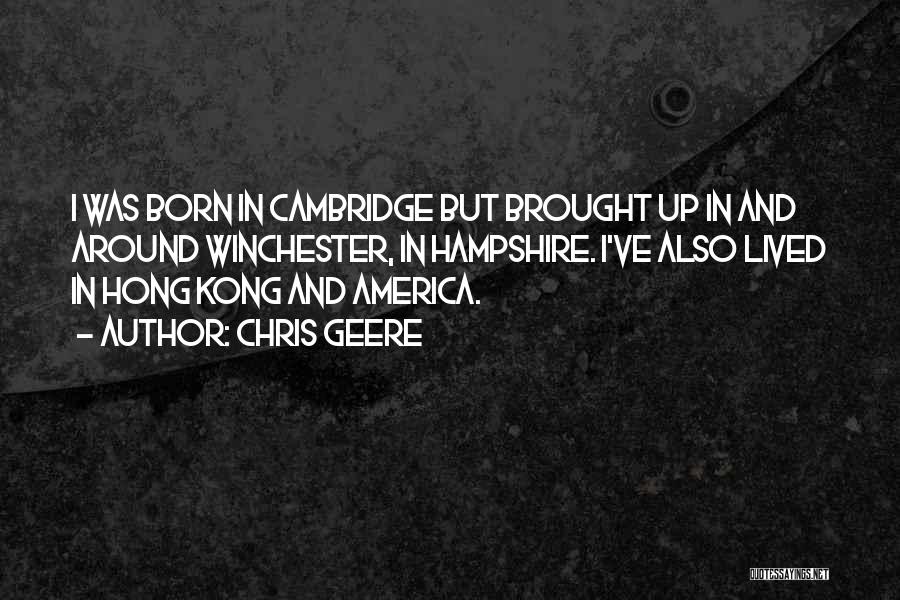
I was born in Cambridge but brought up in and around Winchester, in Hampshire. I've also lived in Hong Kong and America. — Chris Geere
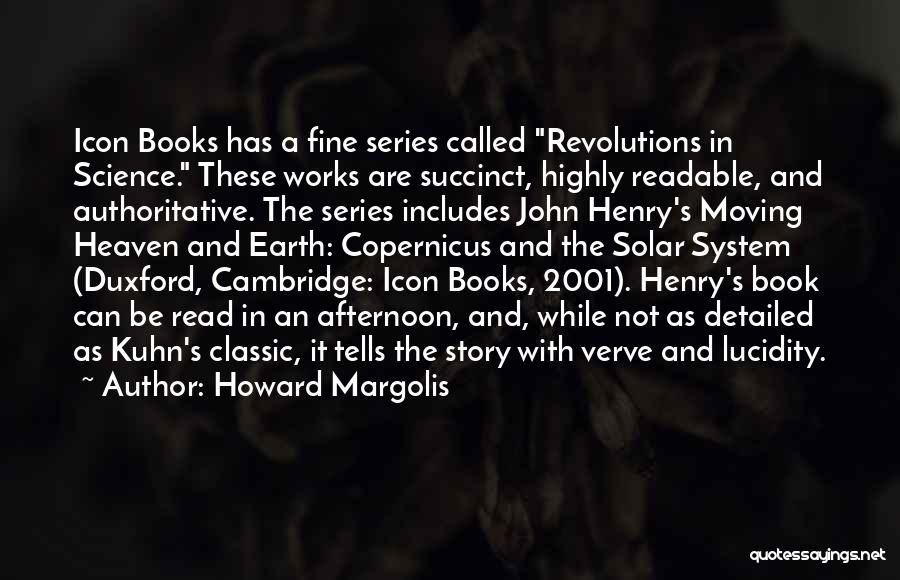
Icon Books has a fine series called "Revolutions in Science." These works are succinct, highly readable, and authoritative. The series includes John Henry's Moving Heaven and Earth: Copernicus and the Solar System (Duxford, Cambridge: Icon Books, 2001). Henry's book can be read in an afternoon, and, while not as detailed as Kuhn's classic, it tells the story with verve and lucidity. — Howard Margolis
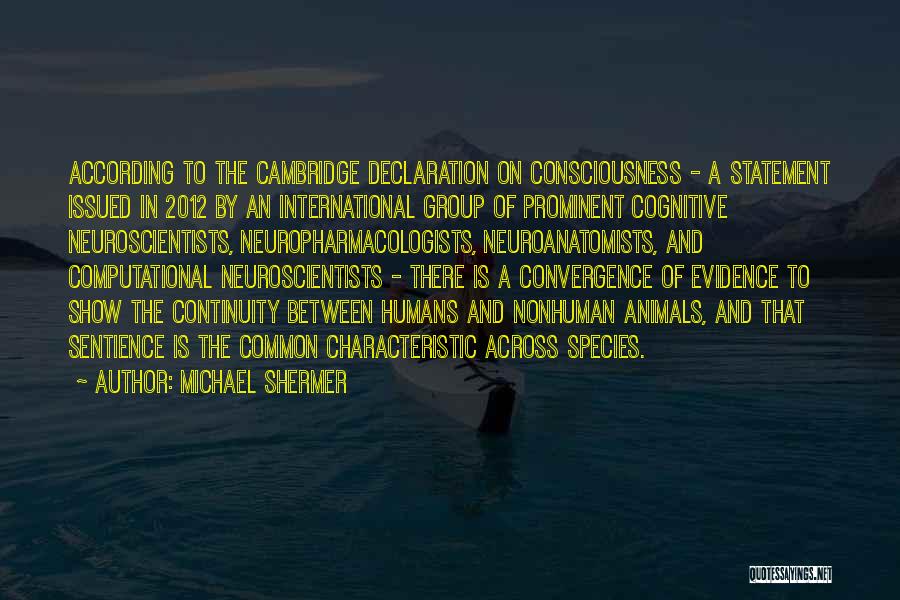
According to the Cambridge Declaration on Consciousness - a statement issued in 2012 by an international group of prominent cognitive neuroscientists, neuropharmacologists, neuroanatomists, and computational neuroscientists - there is a convergence of evidence to show the continuity between humans and nonhuman animals, and that sentience is the common characteristic across species. — Michael Shermer
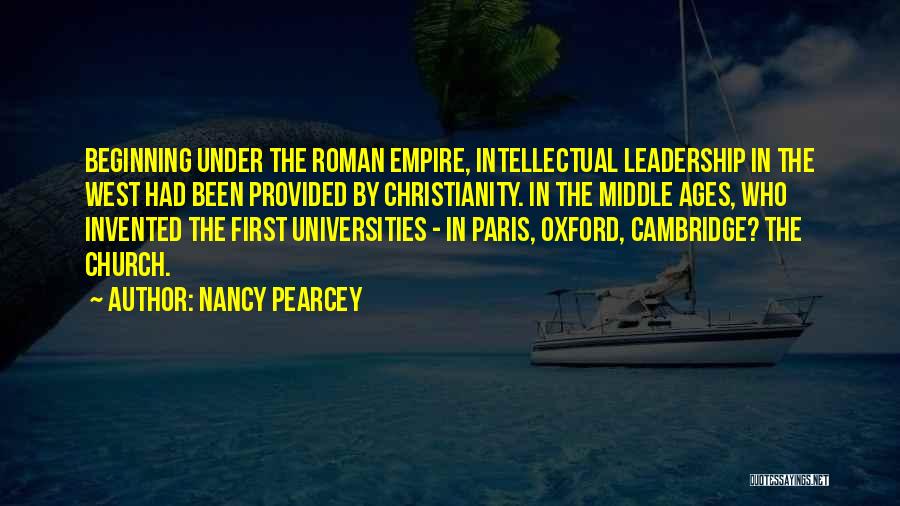
Beginning under the Roman Empire, intellectual leadership in the West had been provided by Christianity. In the middle ages, who invented the first universities - in Paris, Oxford, Cambridge? The church. — Nancy Pearcey

Would physics at Geneva be as good as physics at Harvard? I think not. Rome? I think not. In Britain, I don't think there is one place, neither Cambridge nor Oxford, which can compare with Harvard. — Sheldon Lee Glashow
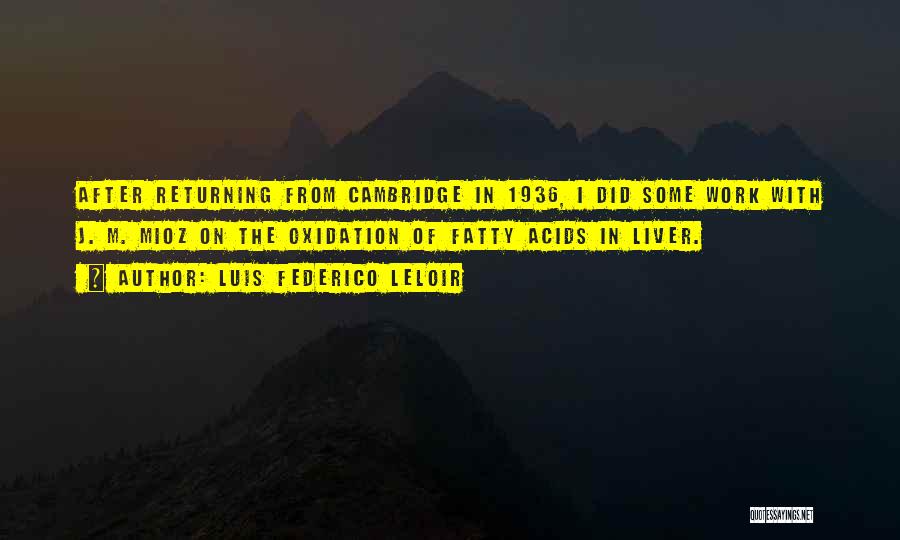
After returning from Cambridge in 1936, I did some work with J. M. Mioz on the oxidation of fatty acids in liver. — Luis Federico Leloir
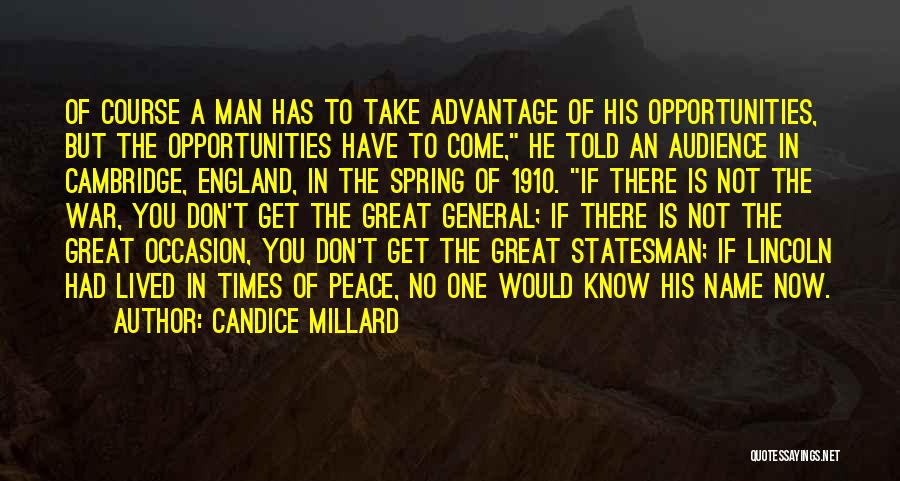
Of course a man has to take advantage of his opportunities, but the opportunities have to come," he told an audience in Cambridge, England, in the spring of 1910. "If there is not the war, you don't get the great general; if there is not the great occasion, you don't get the great statesman; if Lincoln had lived in times of peace, no one would know his name now. — Candice Millard
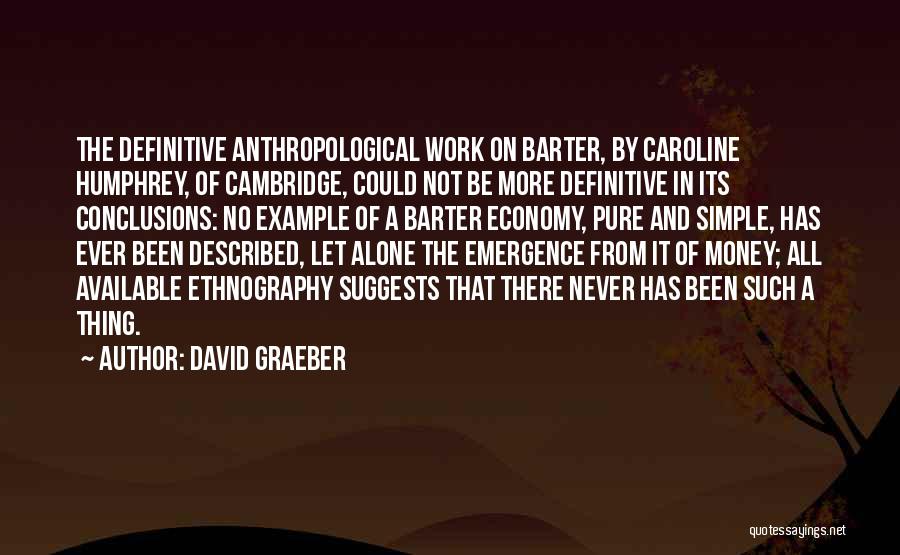
The definitive anthropological work on barter, by Caroline Humphrey, of Cambridge, could not be more definitive in its conclusions: No example of a barter economy, pure and simple, has ever been described, let alone the emergence from it of money; all available ethnography suggests that there never has been such a thing. — David Graeber
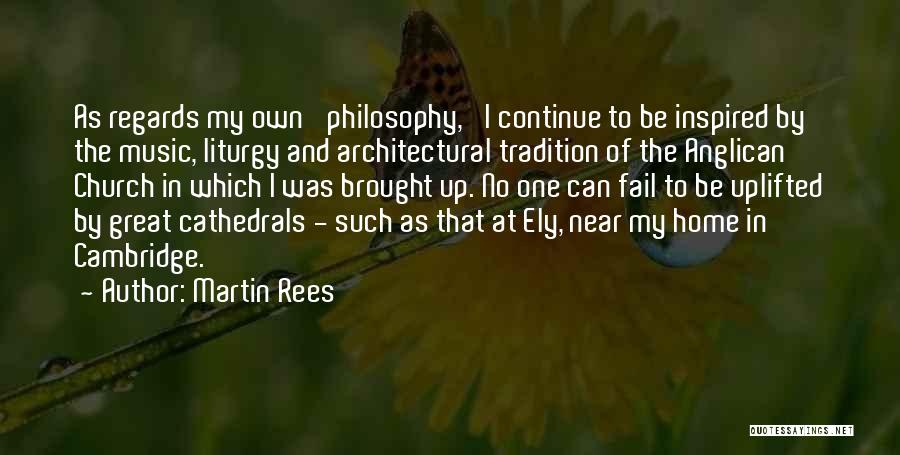
As regards my own 'philosophy,' I continue to be inspired by the music, liturgy and architectural tradition of the Anglican Church in which I was brought up. No one can fail to be uplifted by great cathedrals - such as that at Ely, near my home in Cambridge. — Martin Rees
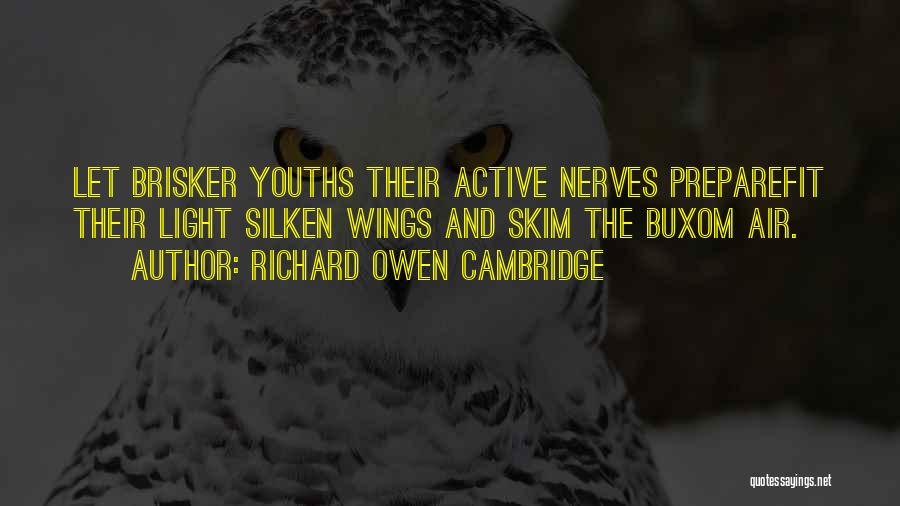
Let brisker youths their active nerves prepare
Fit their light silken wings and skim the buxom air. — Richard Owen Cambridge
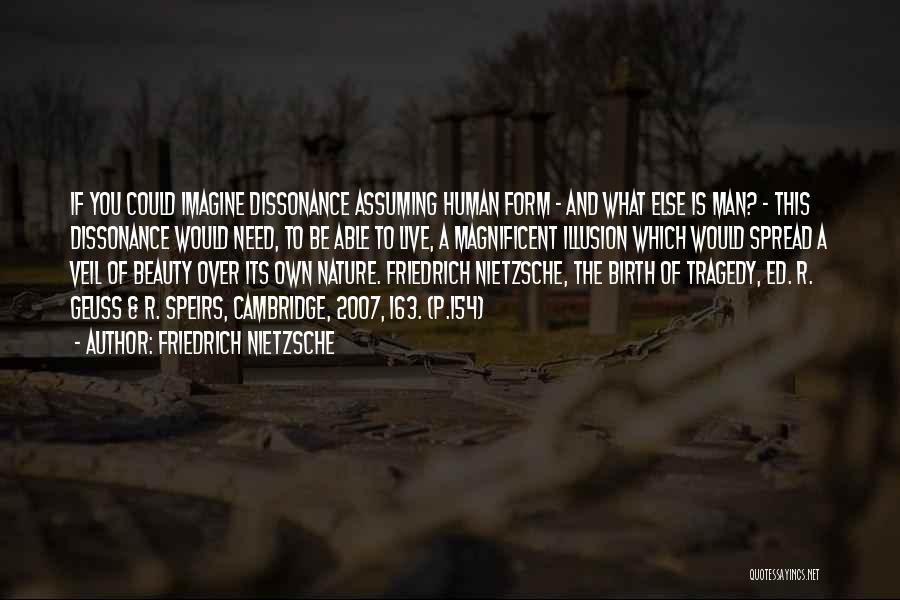
If you could imagine dissonance assuming human form - and what else is man? - this dissonance would need, to be able to live, a magnificent illusion which would spread a veil of beauty over its own nature.
Friedrich Nietzsche, The Birth of Tragedy, ed. R. Geuss & R. Speirs, Cambridge, 2007, 163. (p.154) — Friedrich Nietzsche
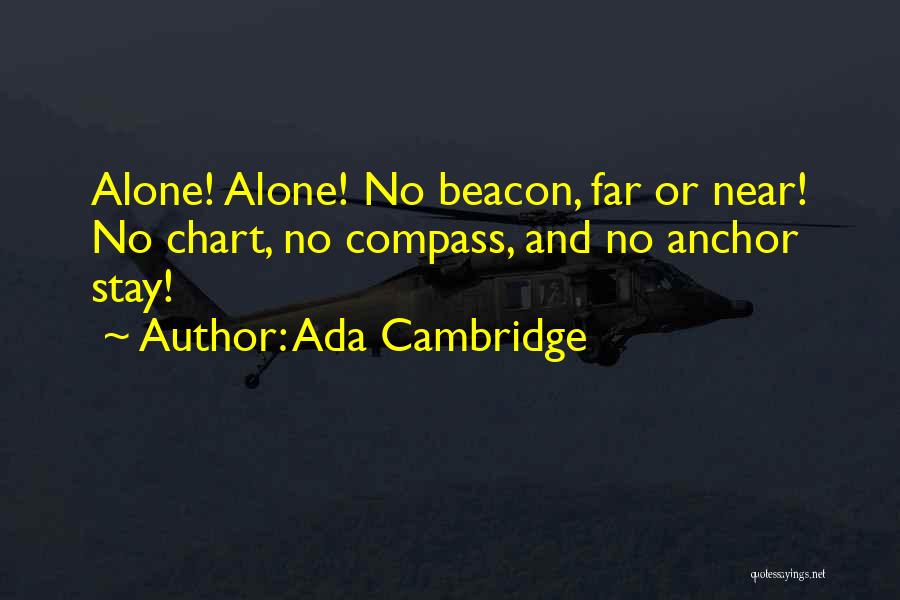
Alone! Alone! No beacon, far or near! No chart, no compass, and no anchor stay! — Ada Cambridge
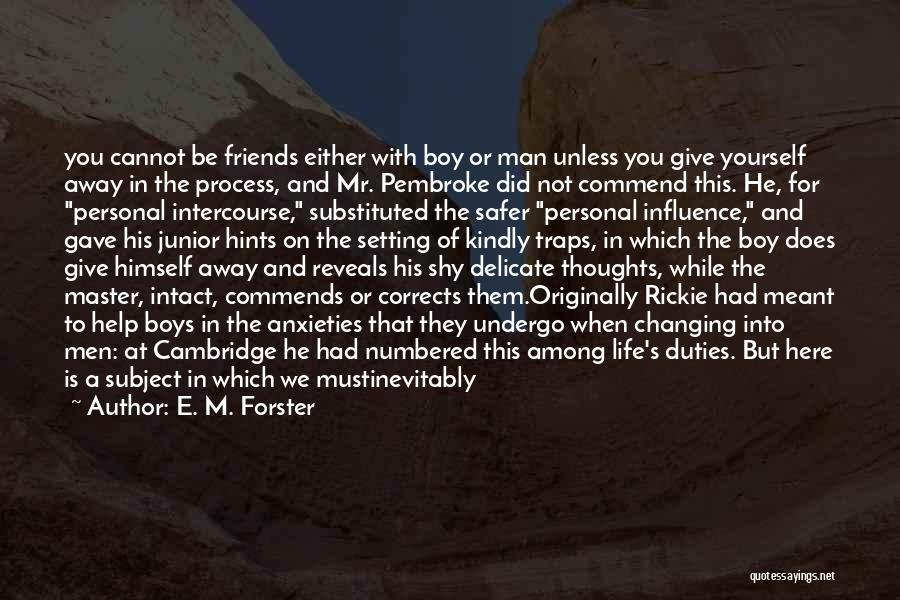
you cannot be friends either with boy or man unless you give yourself away in the process, and Mr. Pembroke did not commend this. He, for "personal intercourse," substituted the safer "personal influence," and gave his junior hints on the setting of kindly traps, in which the boy does give himself away and reveals his shy delicate thoughts, while the master, intact, commends or corrects them.
Originally Rickie had meant to help boys in the anxieties that they undergo when changing into men: at Cambridge he had numbered this among life's duties. But here is a subject in which we must
inevitably speak as one human being to another, not as one who has authority or the shadow of authority, and for this reason the elder school-master could suggest nothing but a few formulae. Formulae, like kindly traps, were not in Rickie's line, so he abandoned these
subjects altogether and confined himself to working hard at what was easy. — E. M. Forster
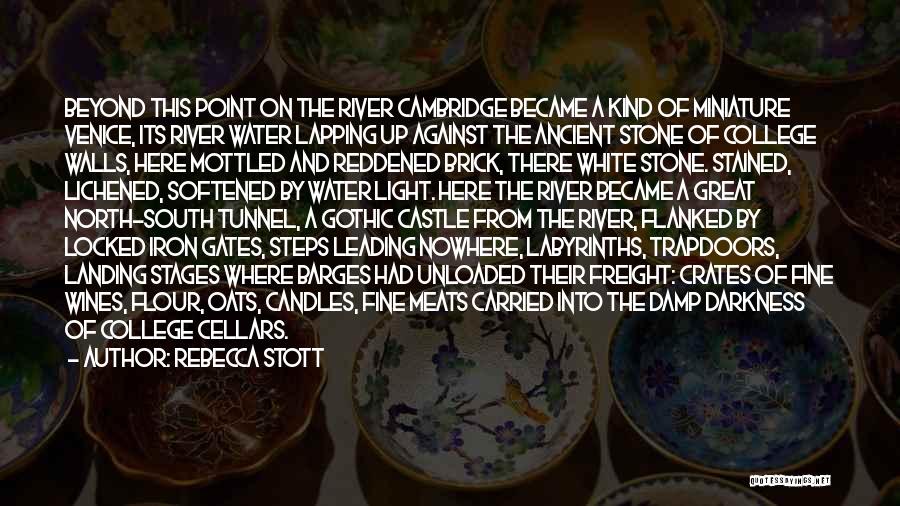
Beyond this point on the river Cambridge became a kind of miniature Venice, its river water lapping up against the ancient stone of college walls, here mottled and reddened brick, there white stone. Stained, lichened, softened by water light. Here the river became a great north-south tunnel, a gothic castle from the river, flanked by locked iron gates, steps leading nowhere, labyrinths, trapdoors, landing stages where barges had unloaded their freight: crates of fine wines, flour, oats, candles, fine meats carried into the damp darkness of college cellars. — Rebecca Stott
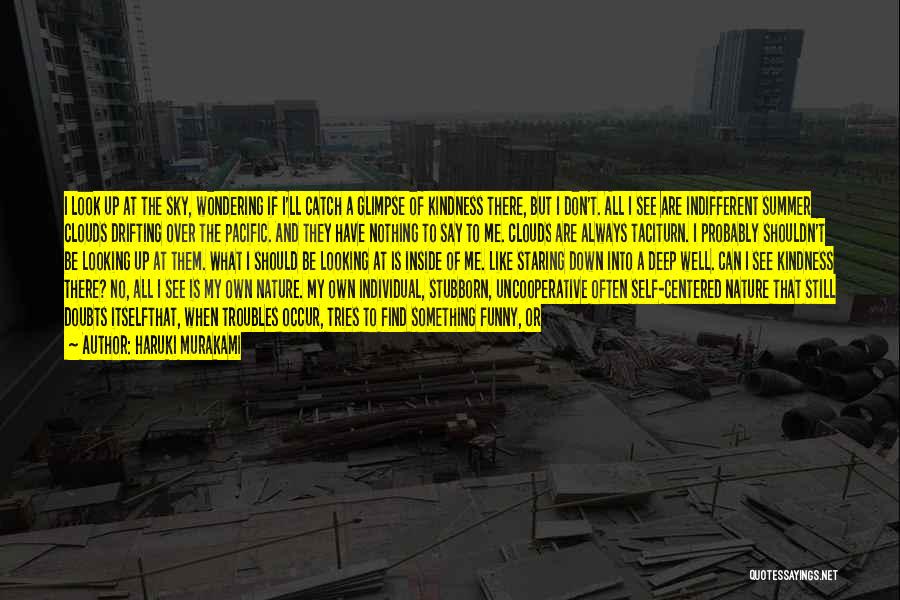
I look up at the sky, wondering if I'll catch a glimpse of kindness there, but I don't. All I see are indifferent summer clouds drifting over the Pacific. And they have nothing to say to me. Clouds are always taciturn. I probably shouldn't be looking up at them. What I should be looking at is inside of me. Like staring down into a deep well. Can I see kindness there? No, all I see is my own nature. My own individual, stubborn, uncooperative often self-centered nature that still doubts itself
that, when troubles occur, tries to find something funny, or something nearly funny, about the situation. I've carried this character around like an old suitcase, down a long, dusty path. I'm not carrying it because I like it. The contents are too heavy, and it looks crummy, fraying in spots. I've carried it with me because there was nothing else I was supposed to carry. Still, I guess I have grown attached to it. As you might expect. — Haruki Murakami
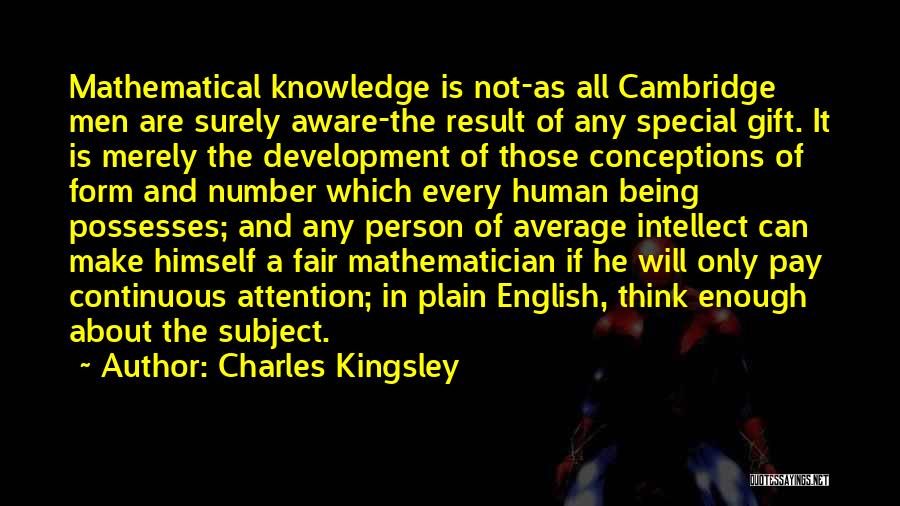
Mathematical knowledge is not-as all Cambridge men are surely aware-the result of any special gift. It is merely the development of those conceptions of form and number which every human being possesses; and any person of average intellect can make himself a fair mathematician if he will only pay continuous attention; in plain English, think enough about the subject. — Charles Kingsley
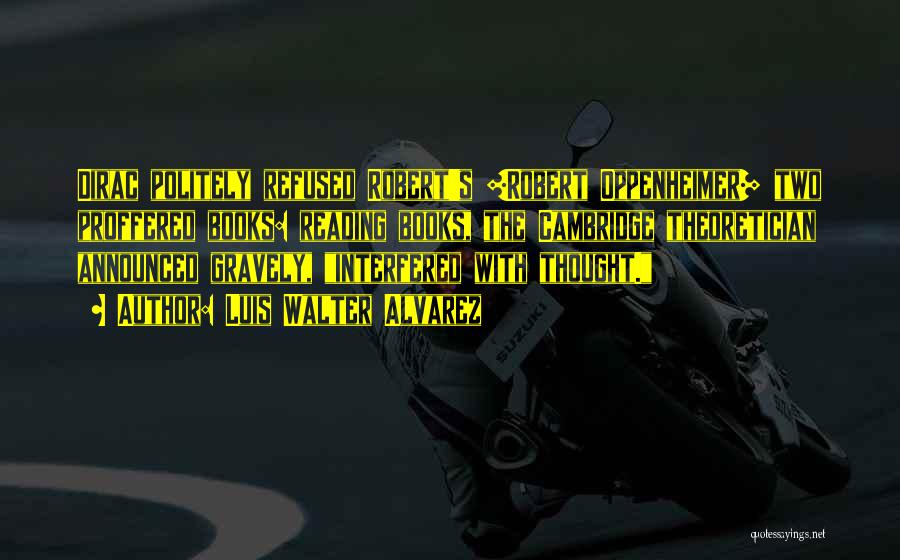
Dirac politely refused Robert's [Robert Oppenheimer] two proffered books: reading books, the Cambridge theoretician announced gravely, "interfered with thought." — Luis Walter Alvarez






